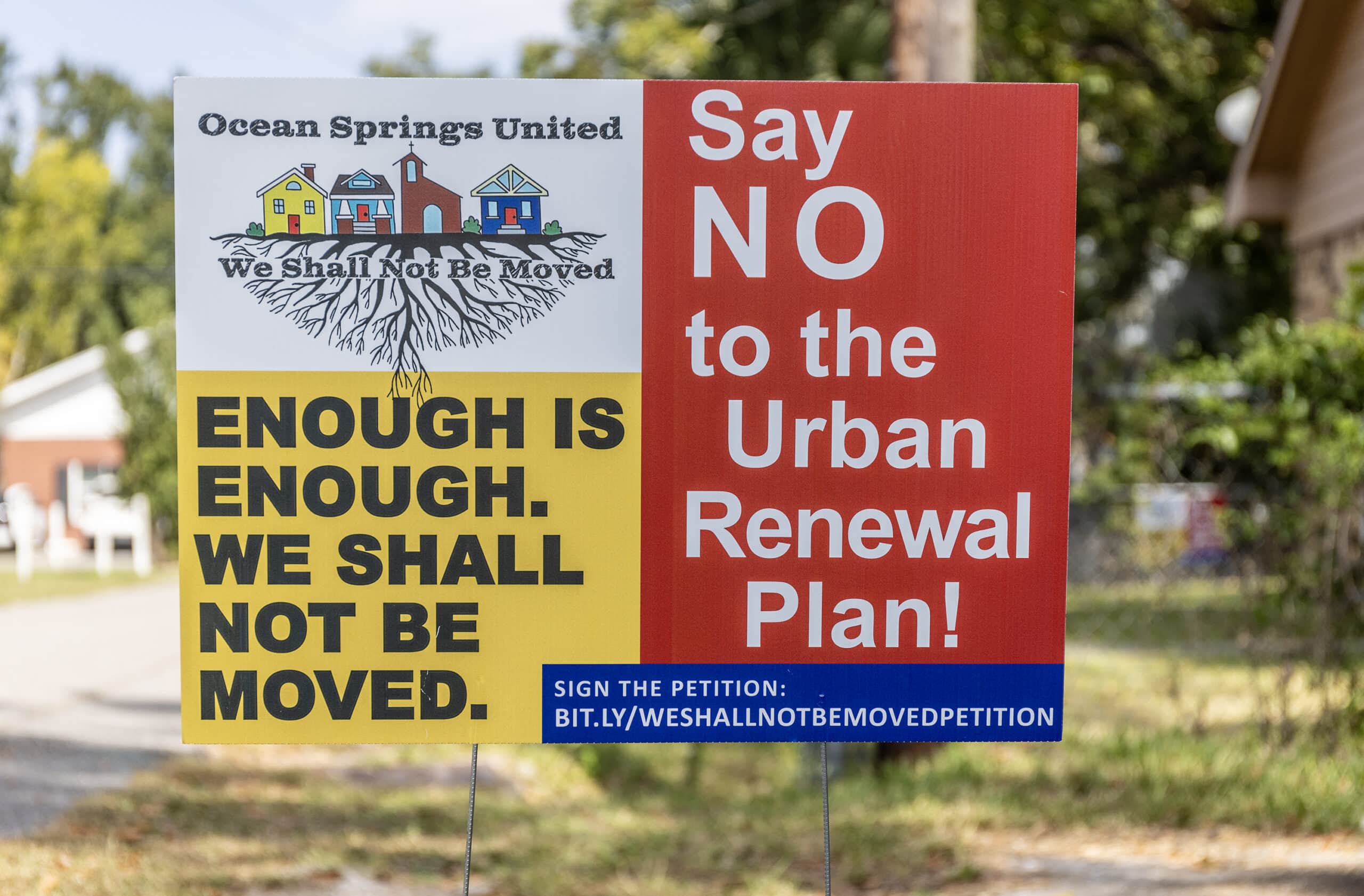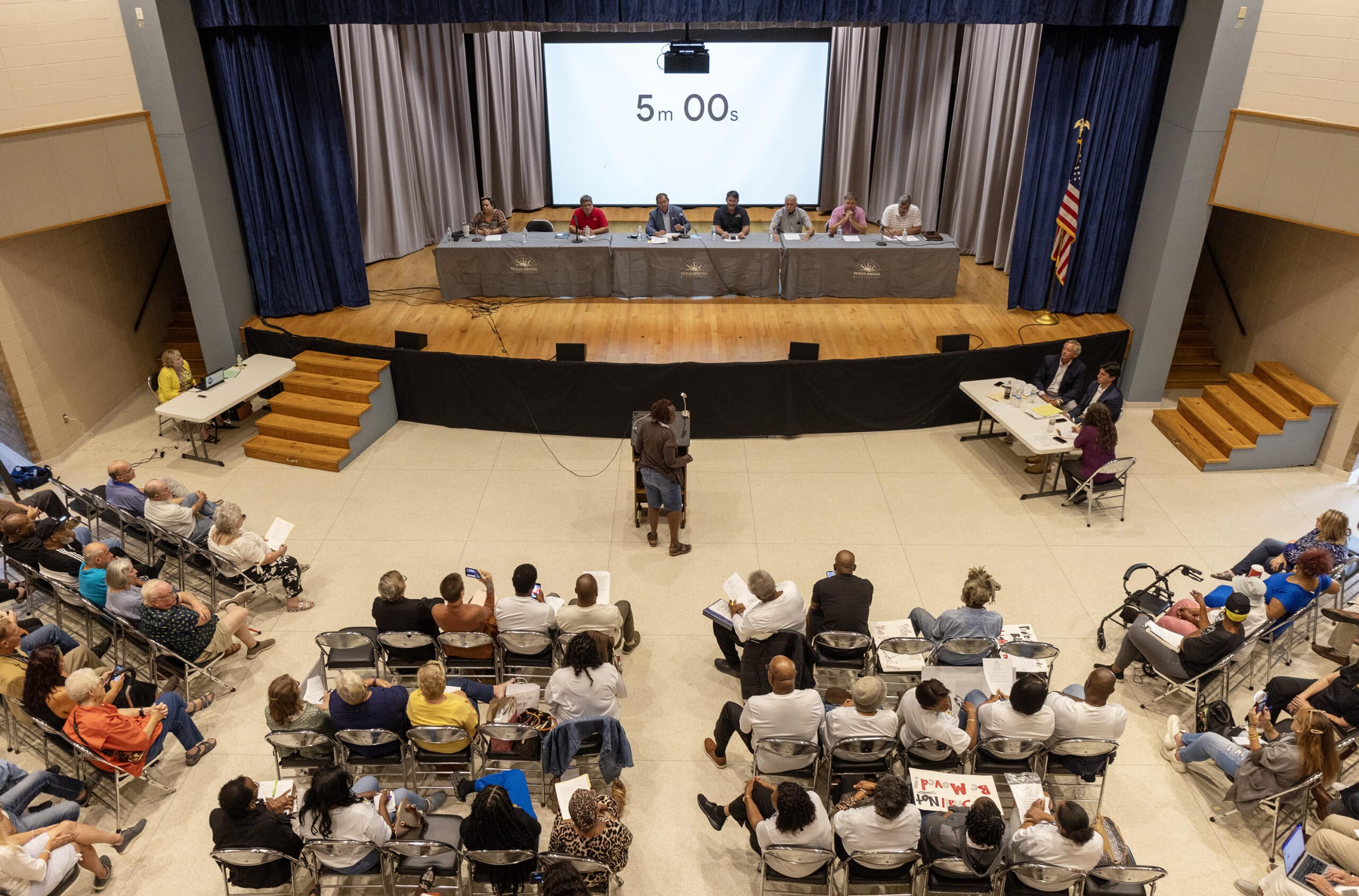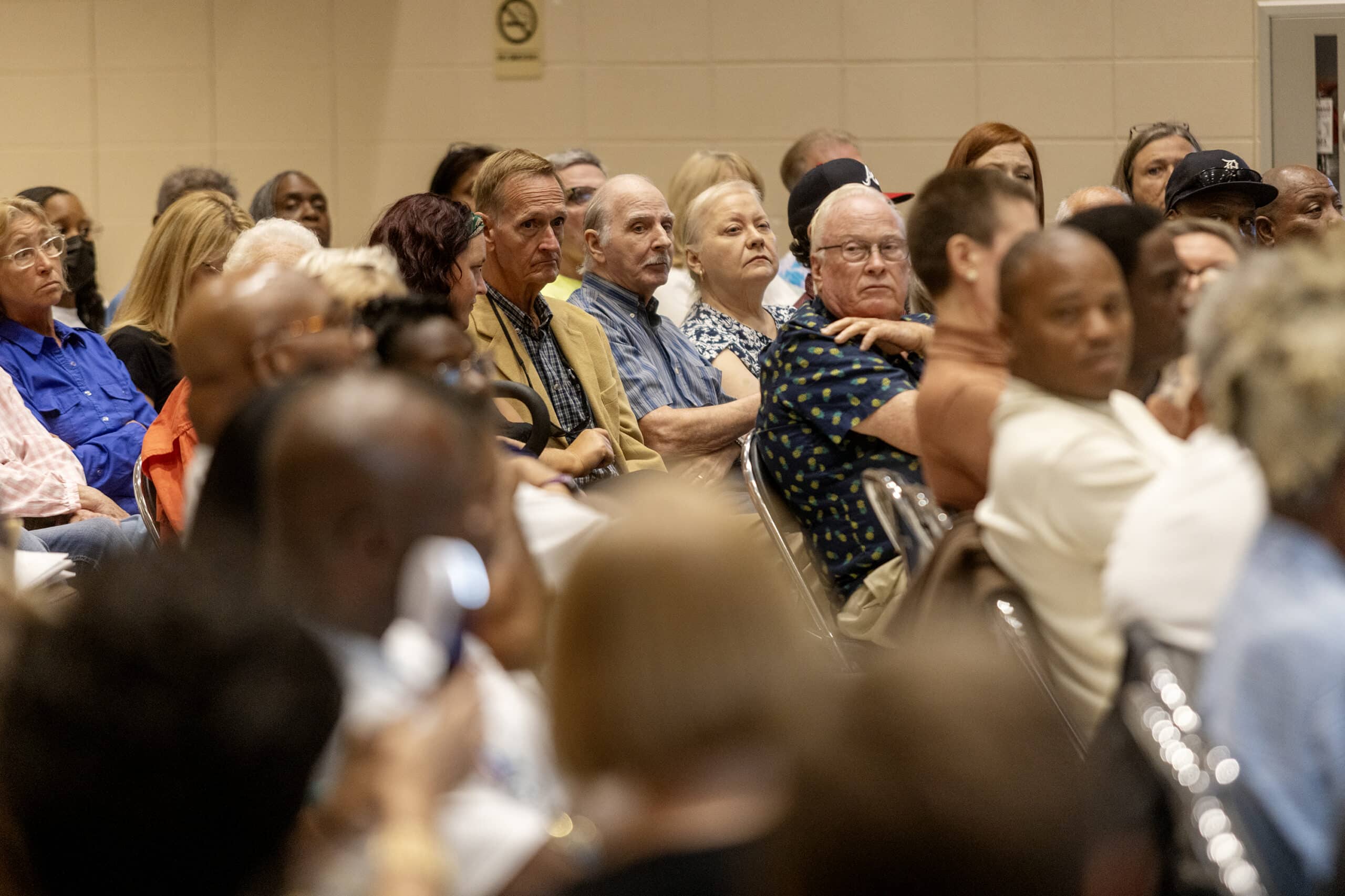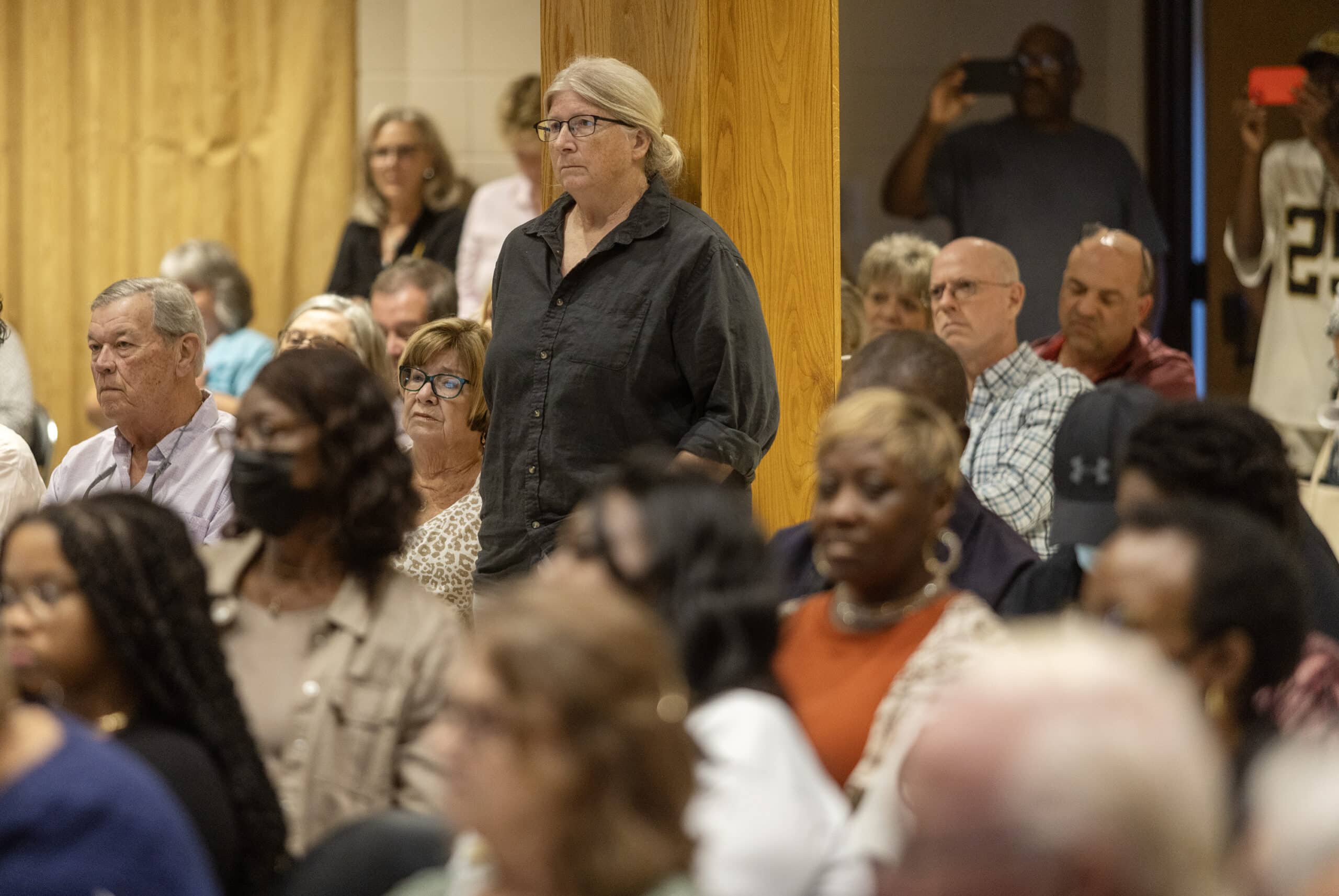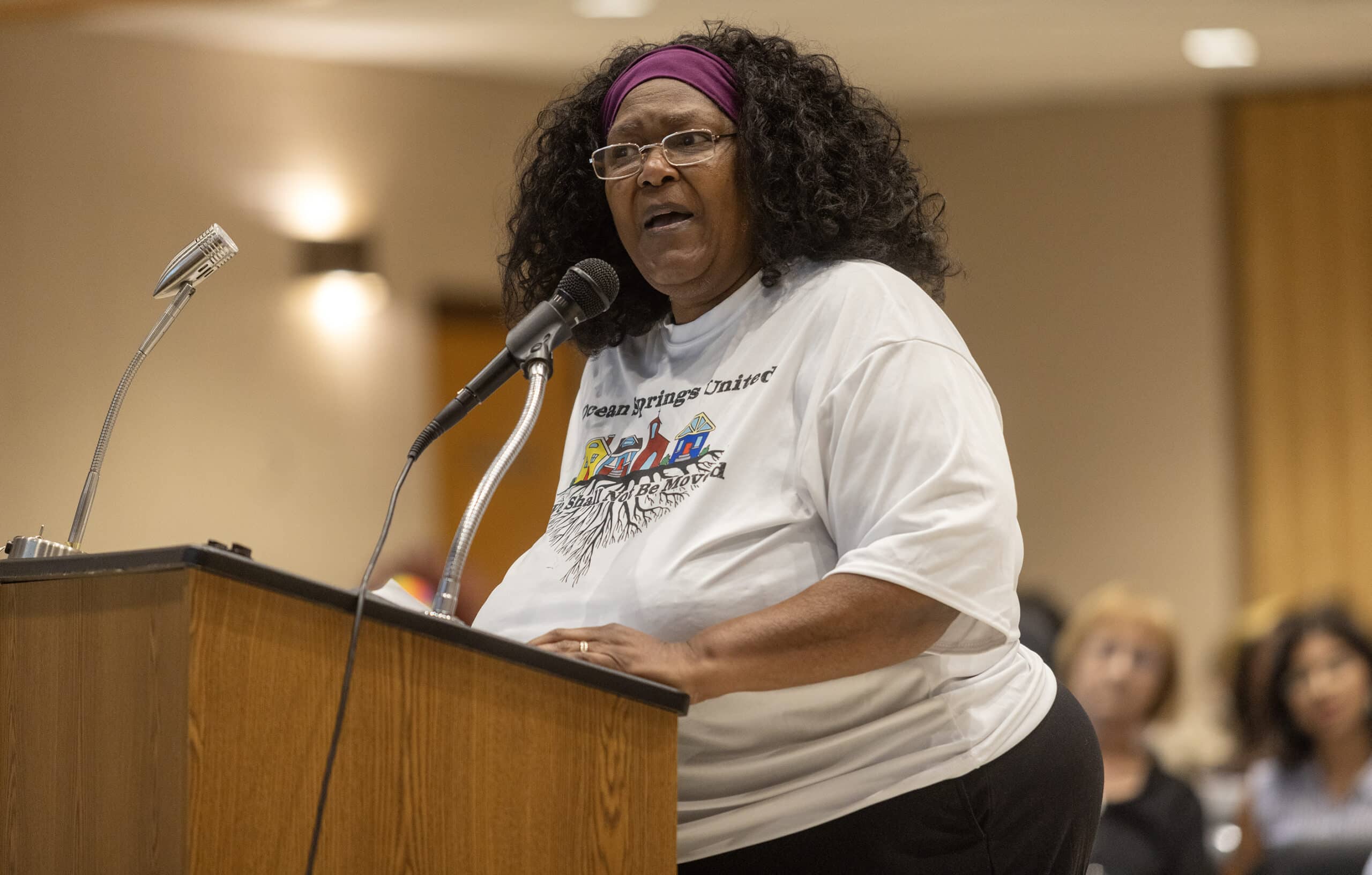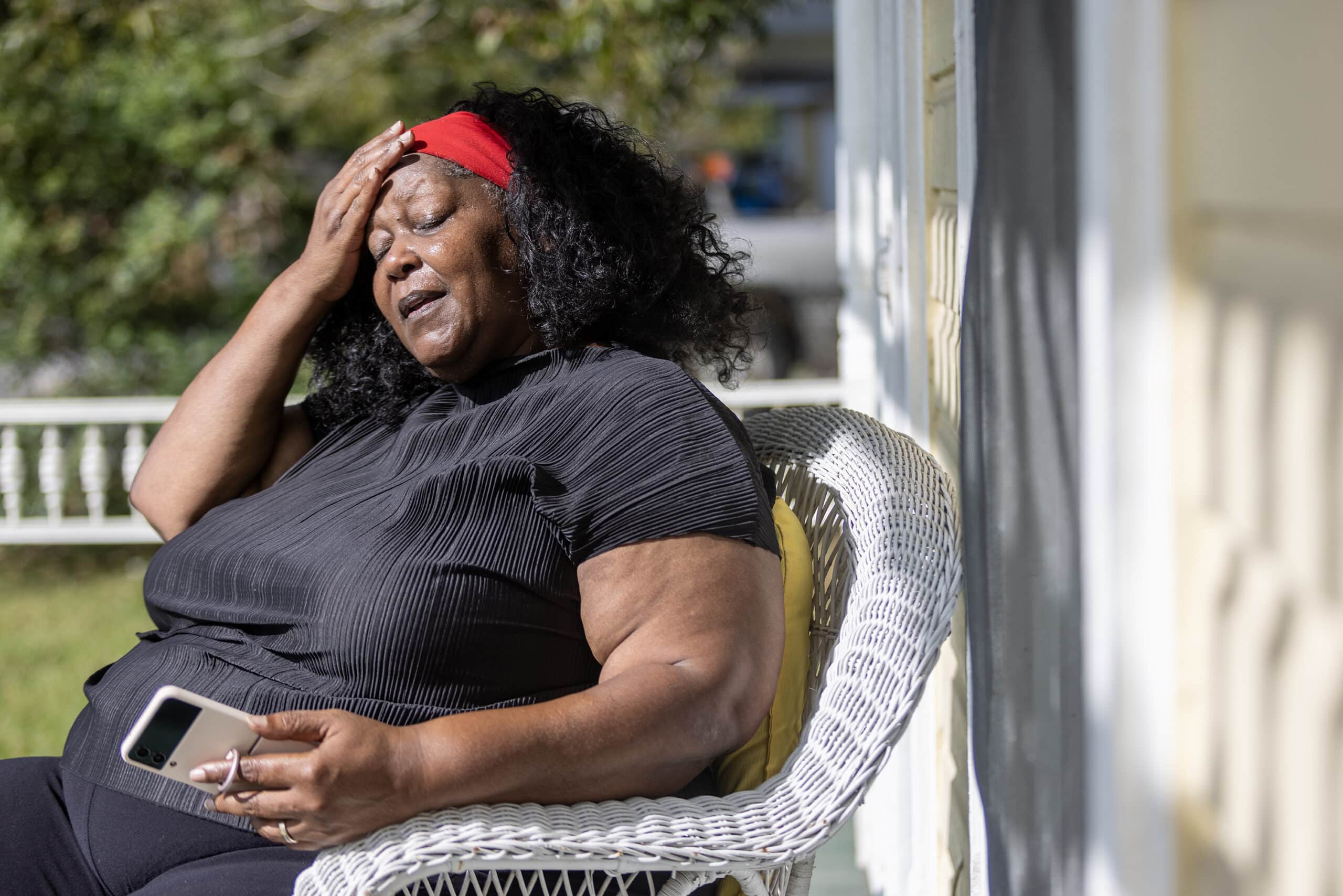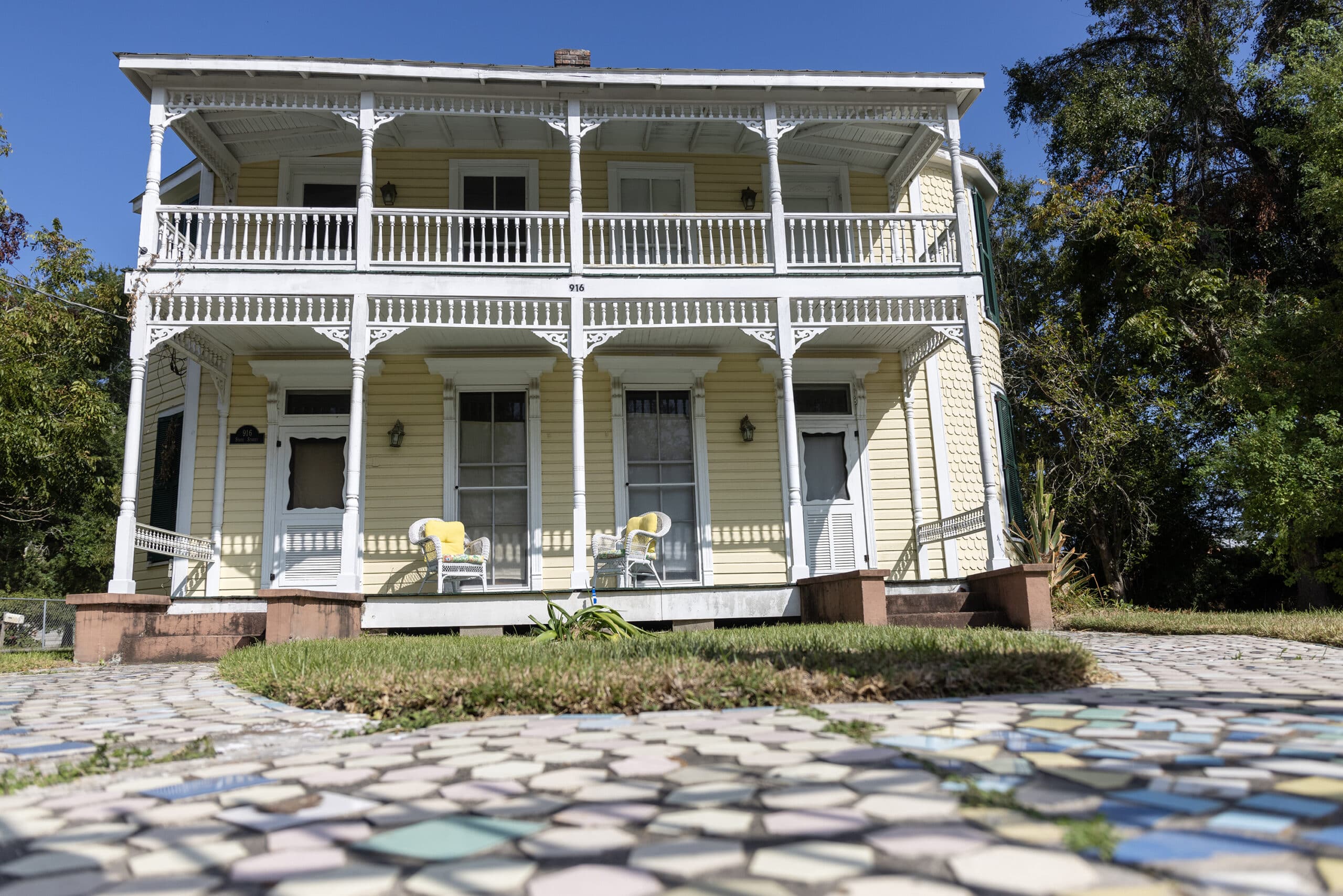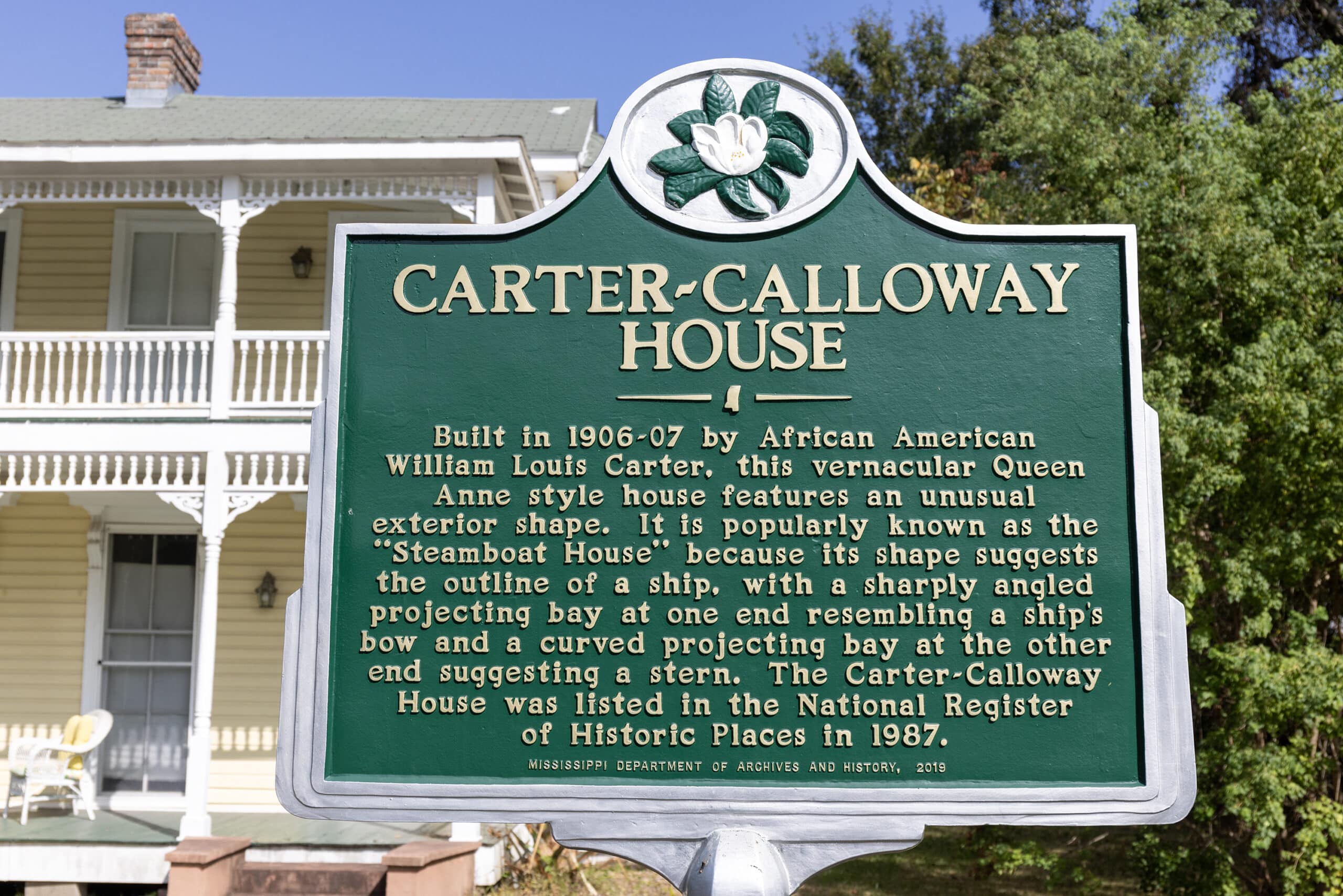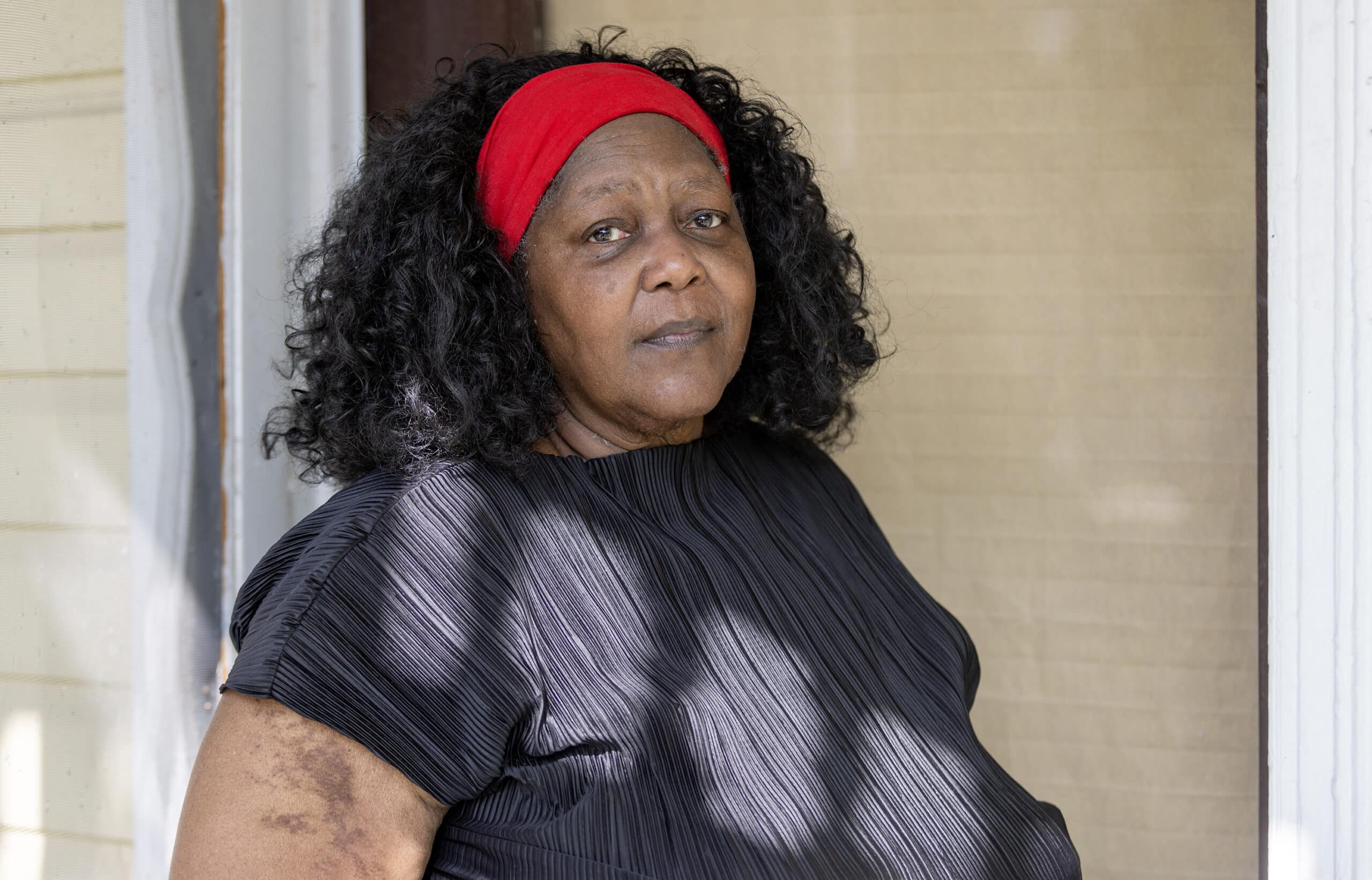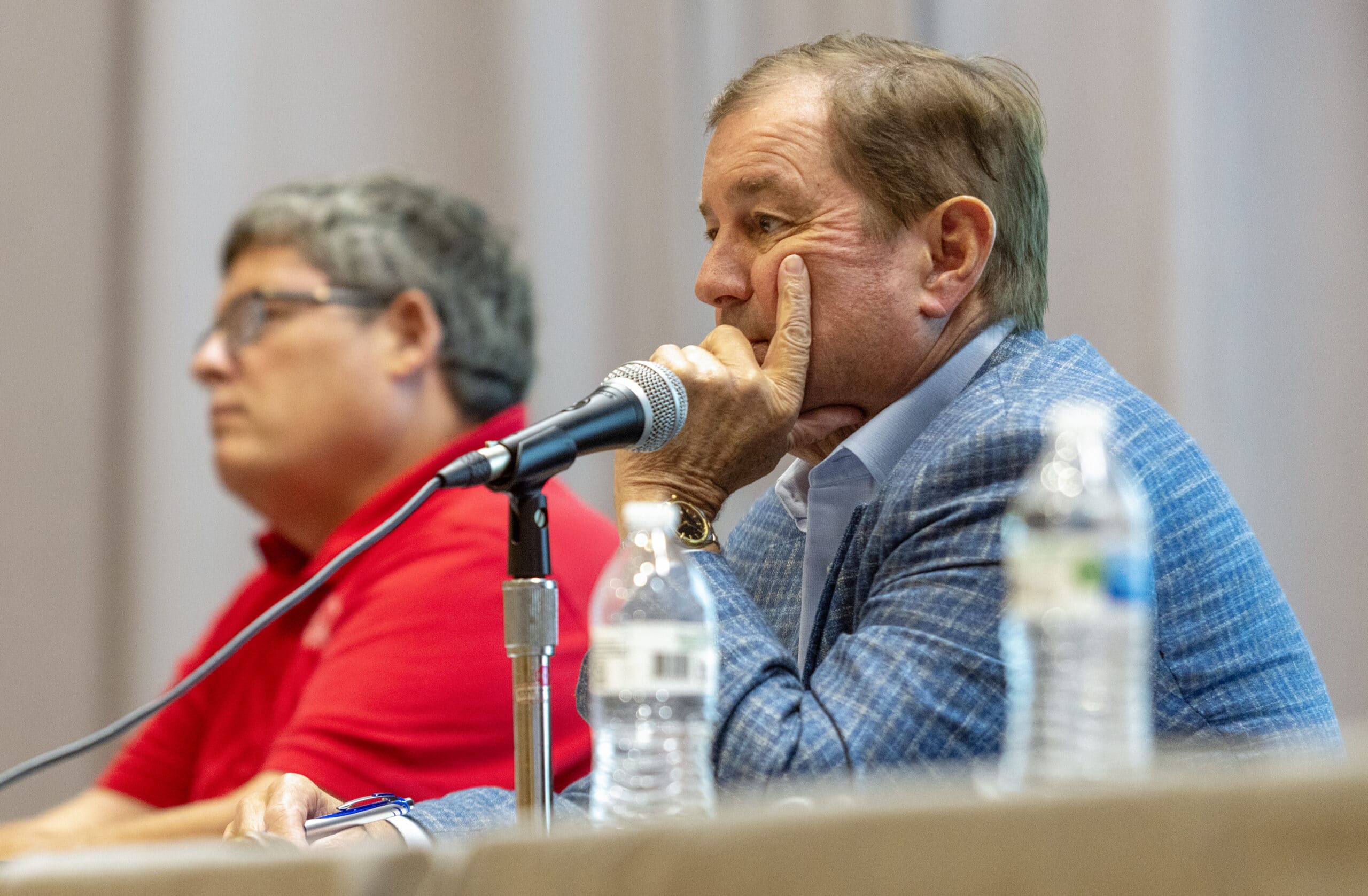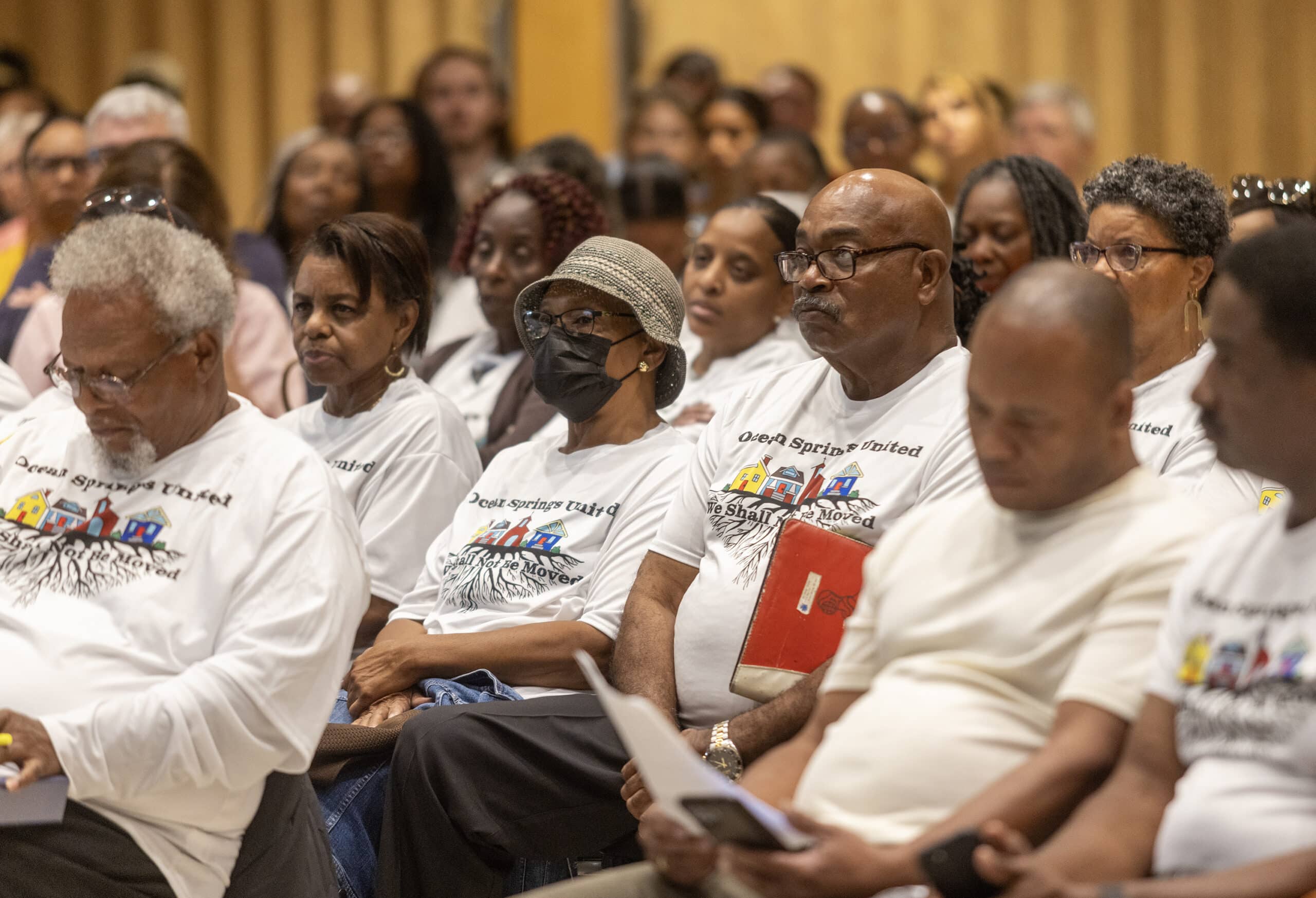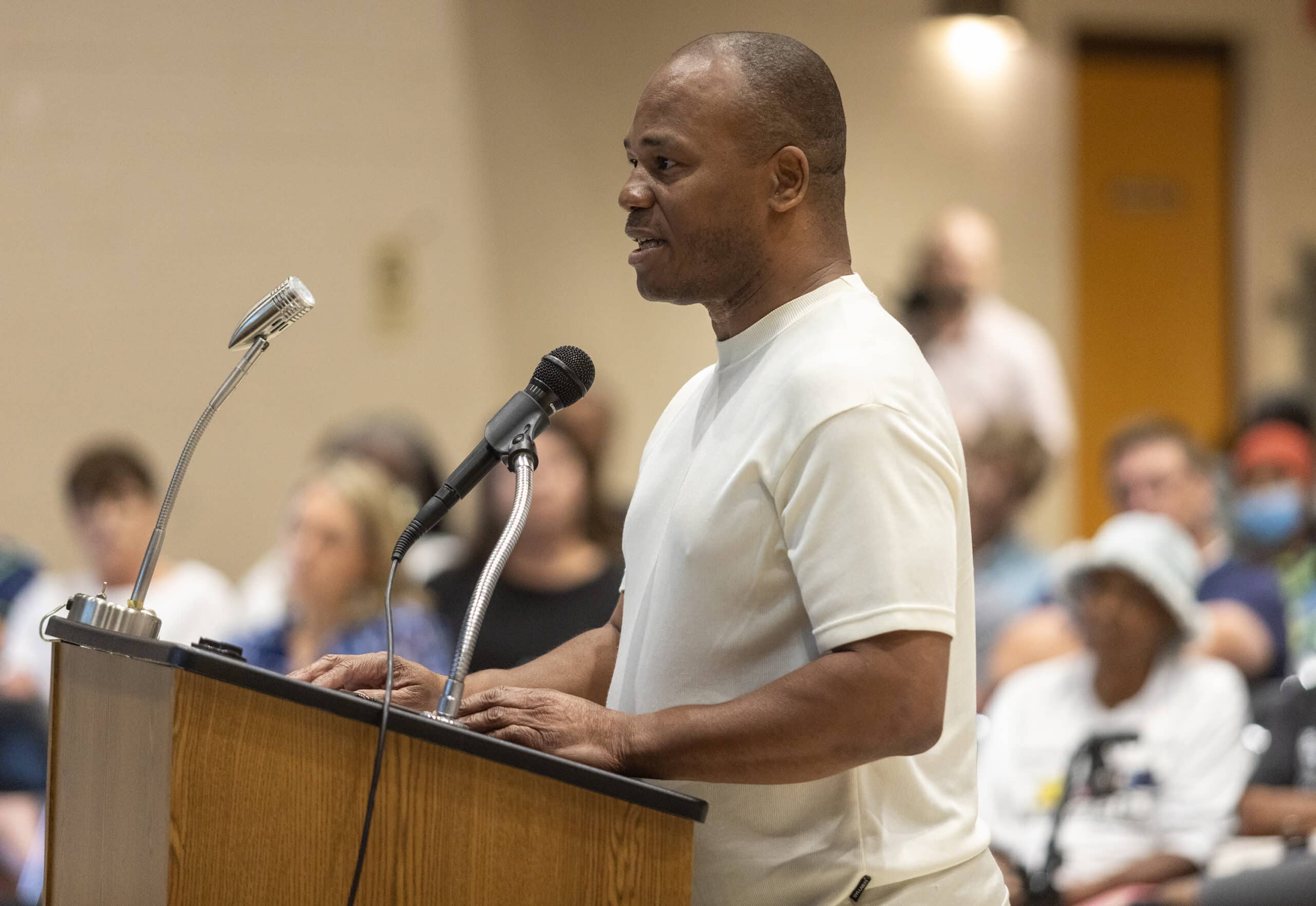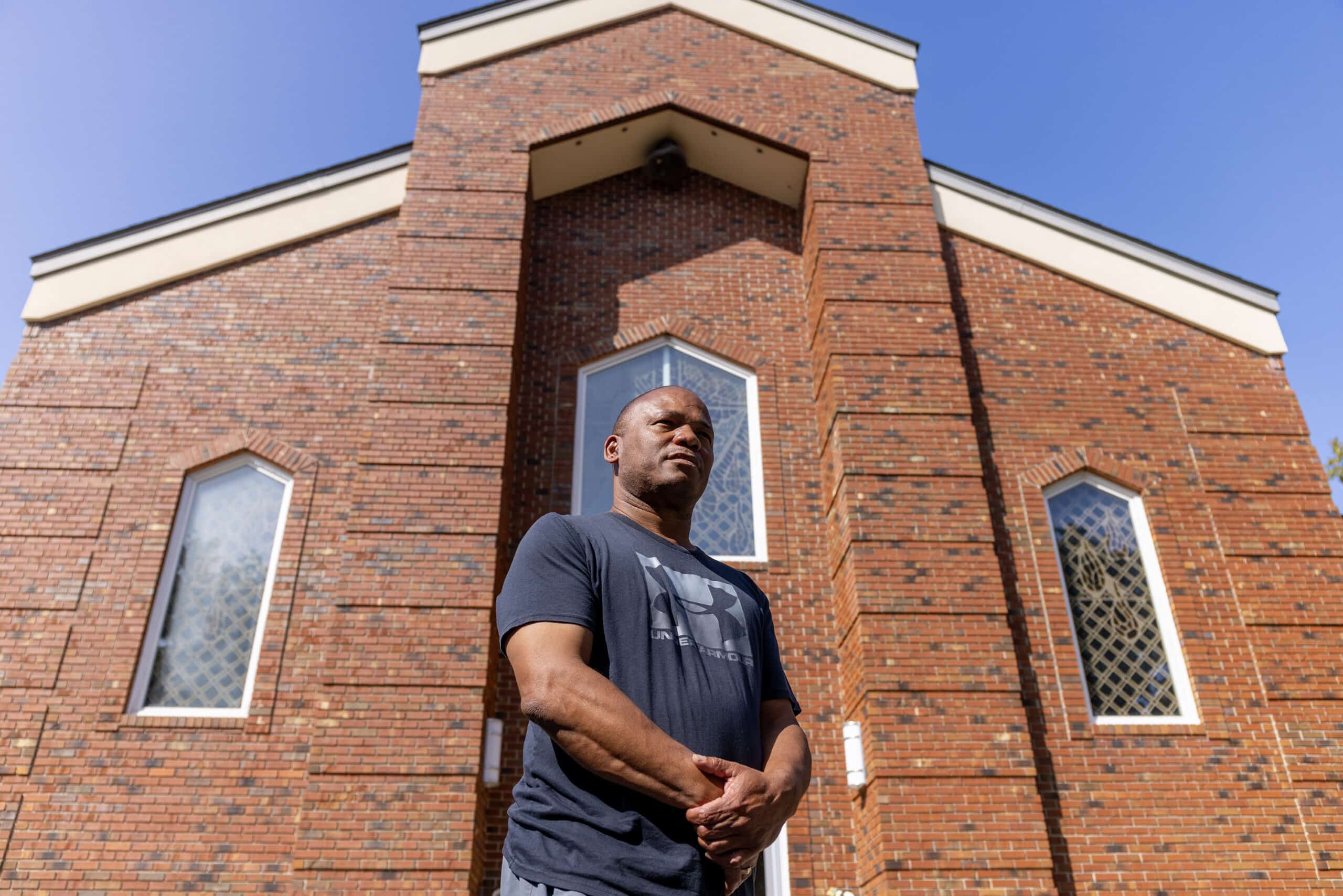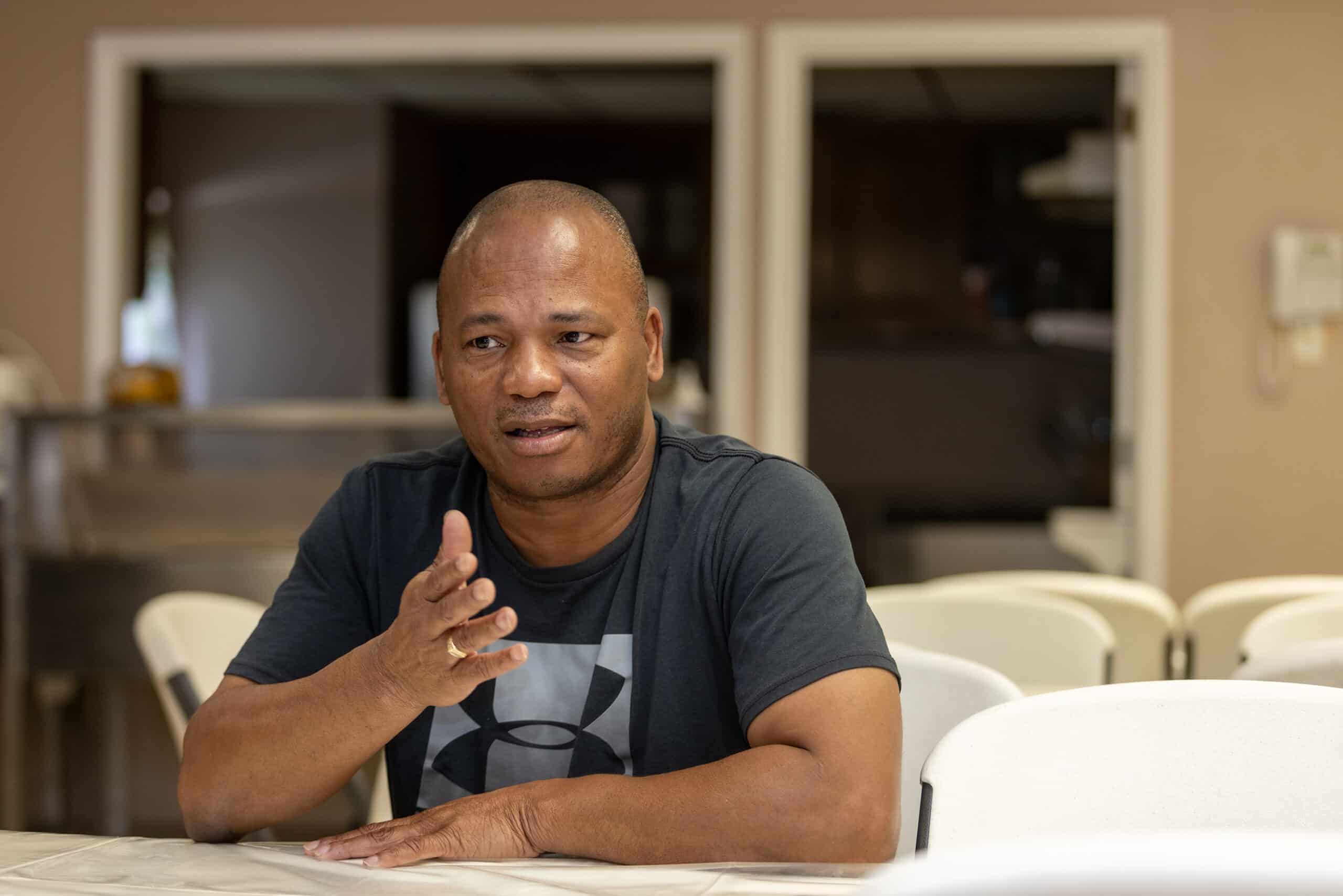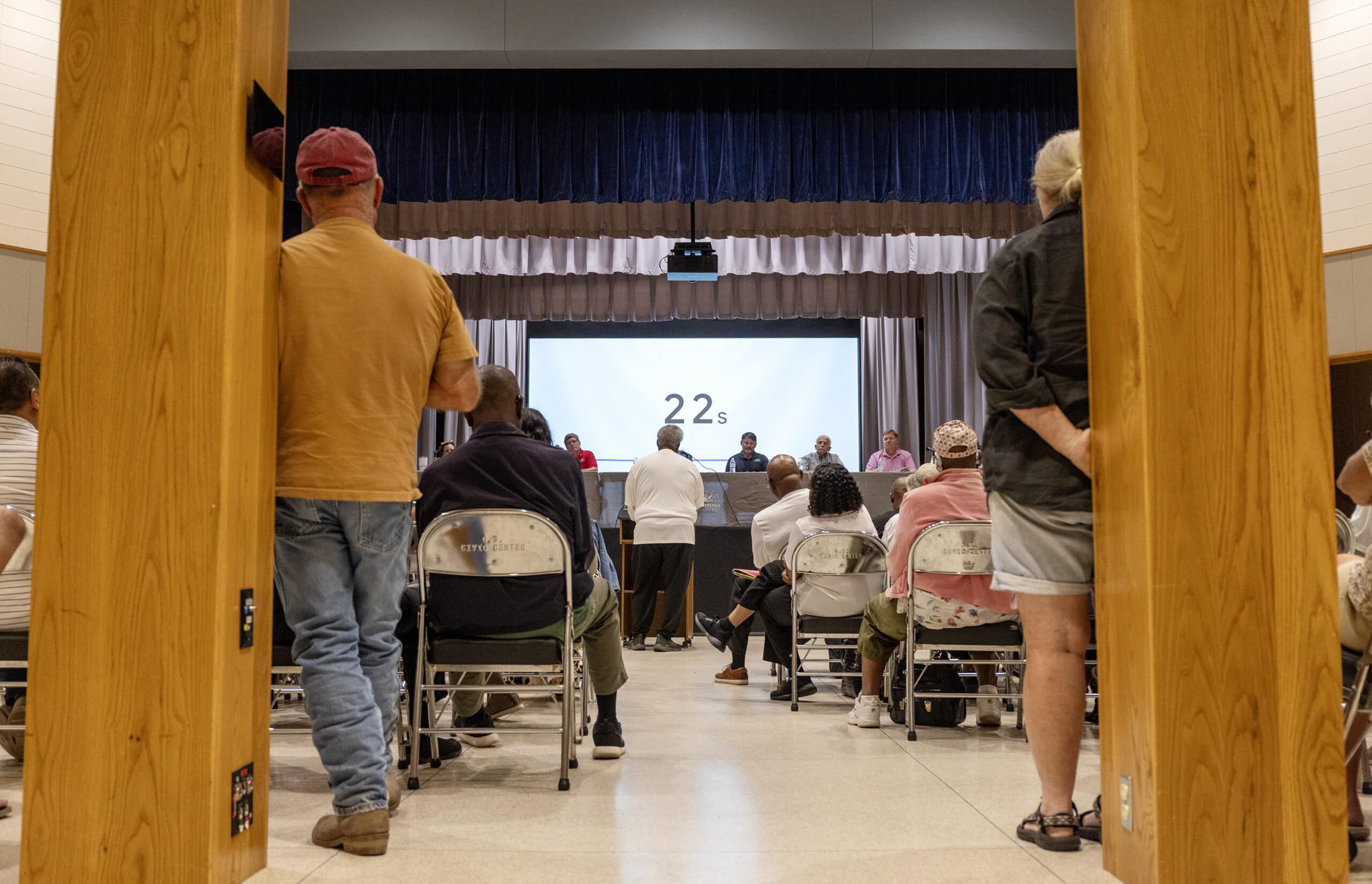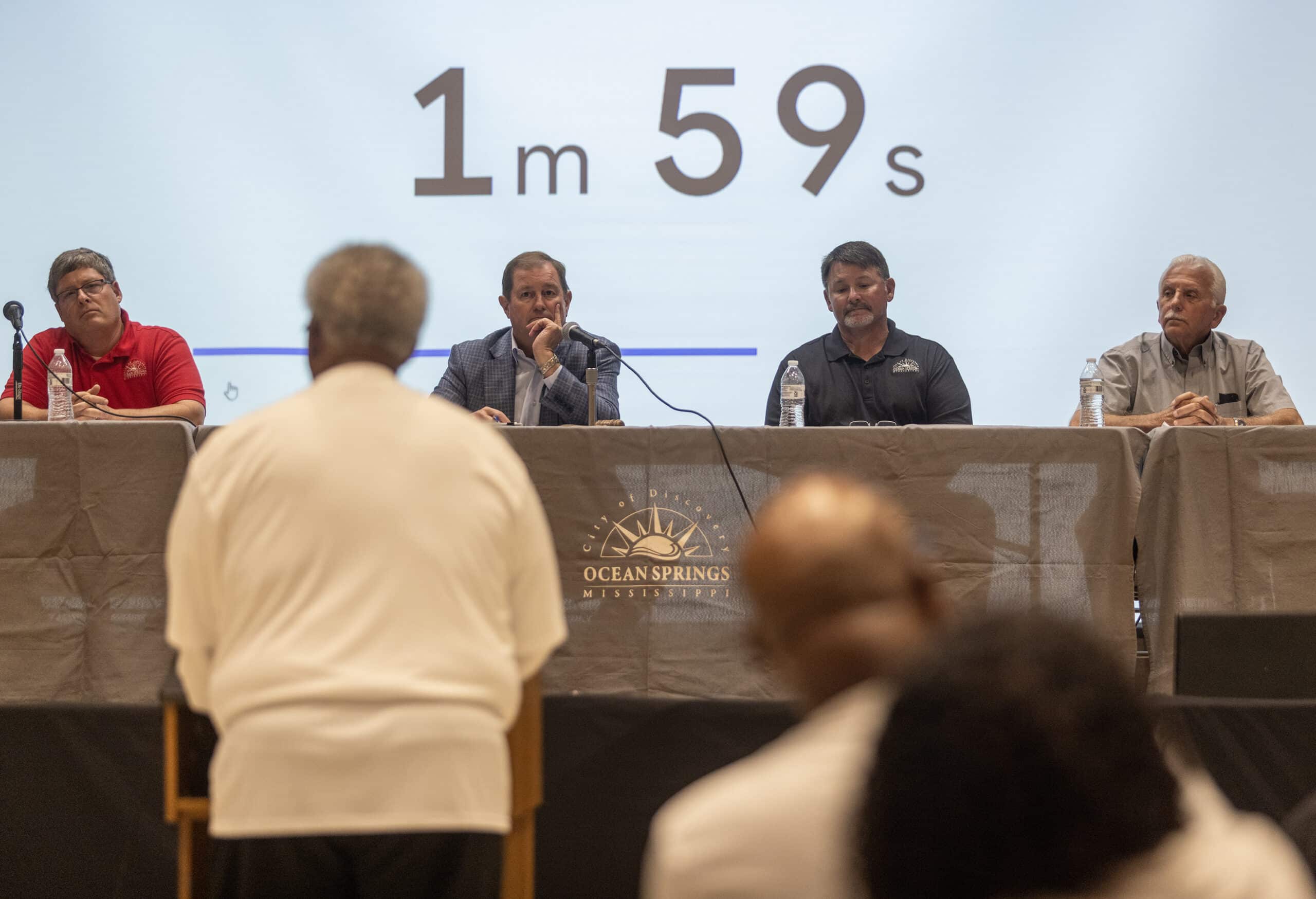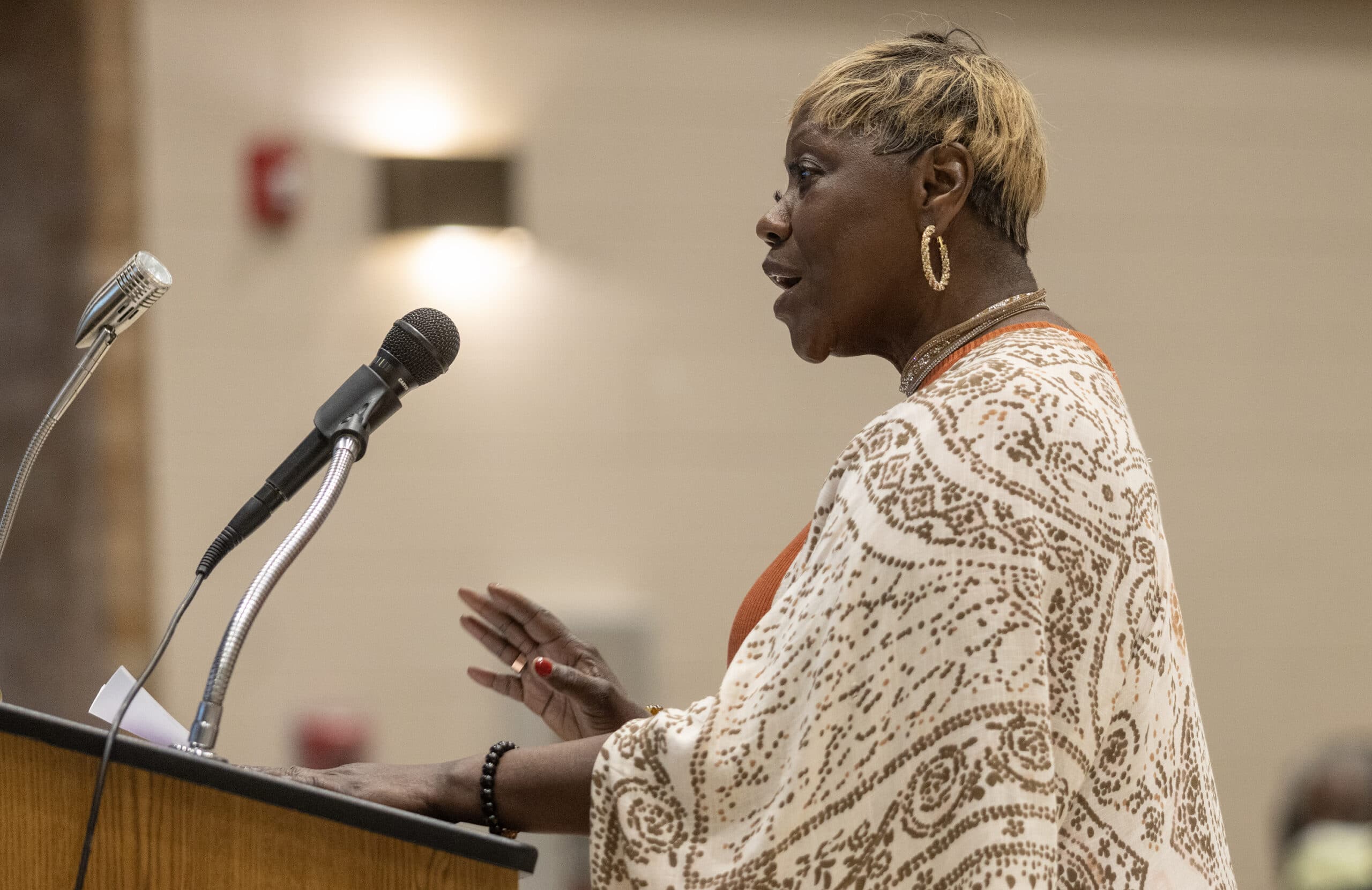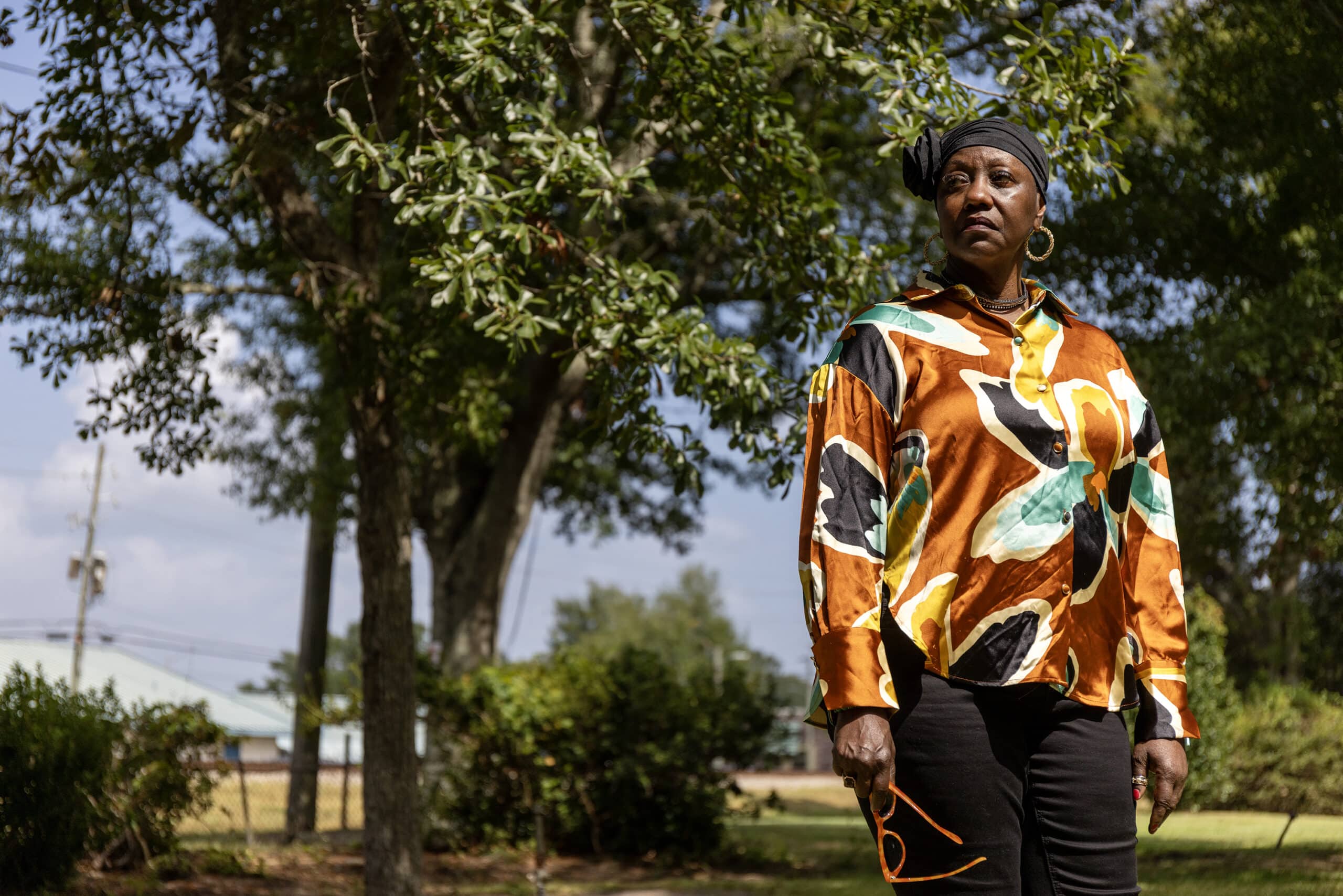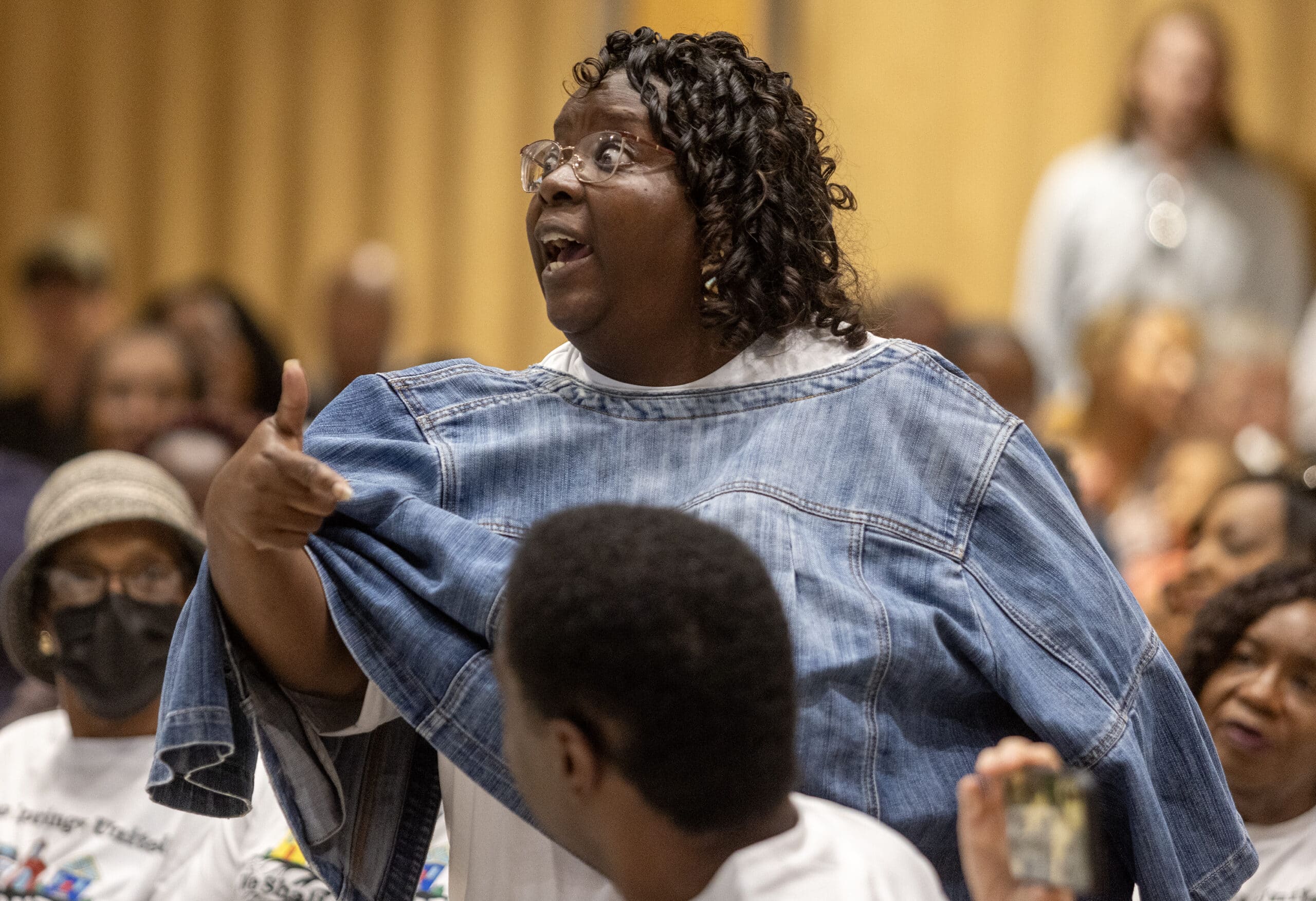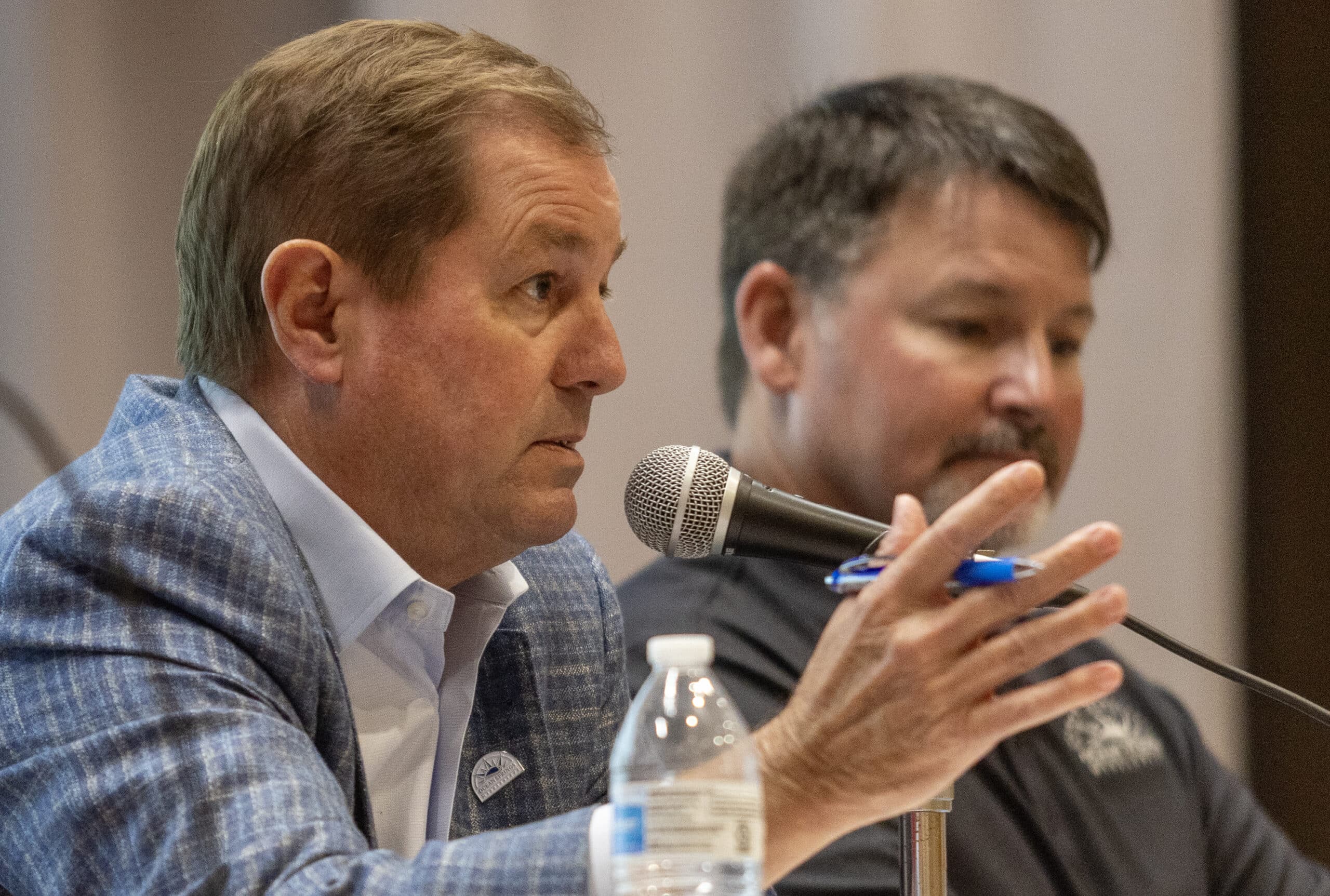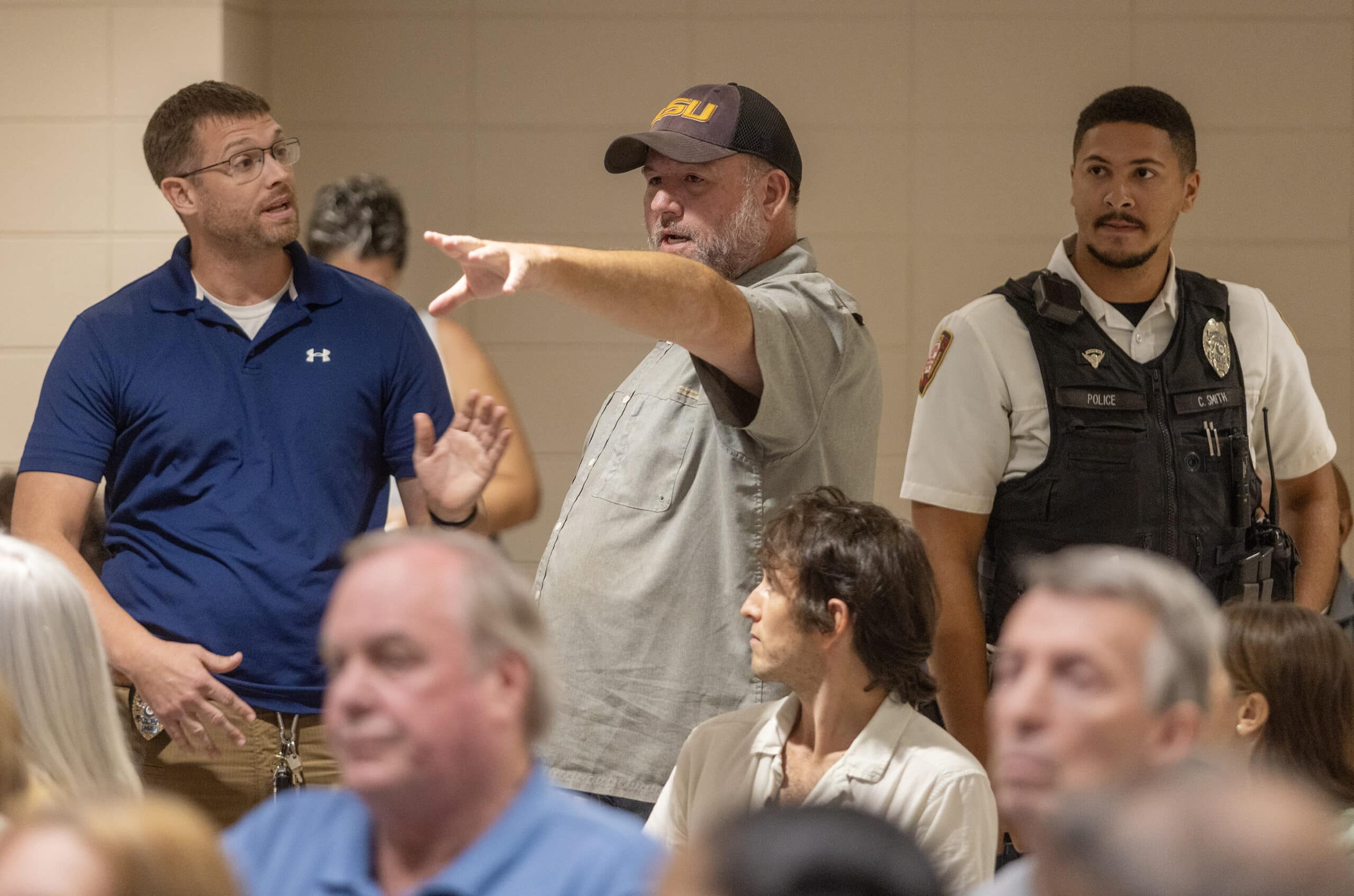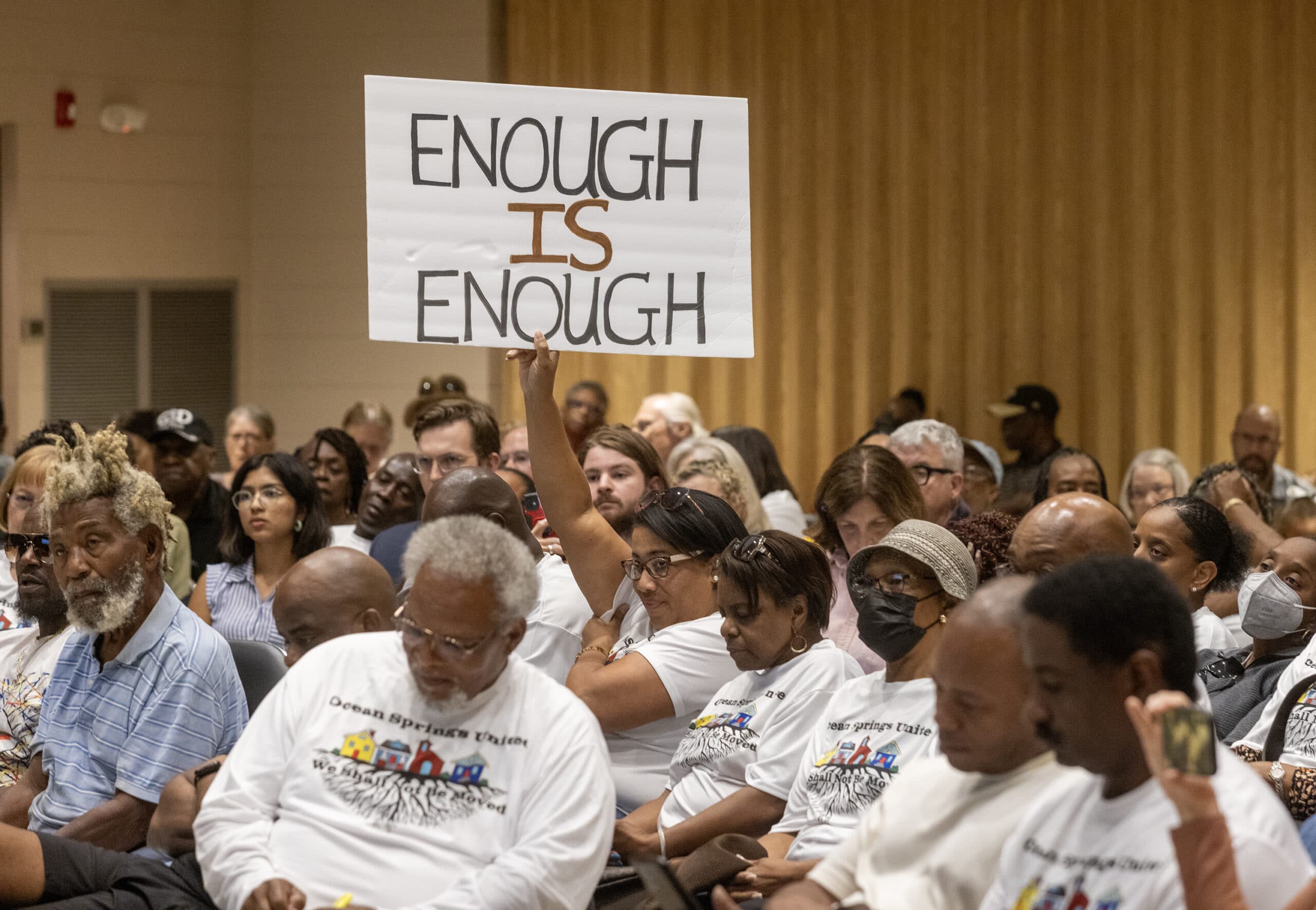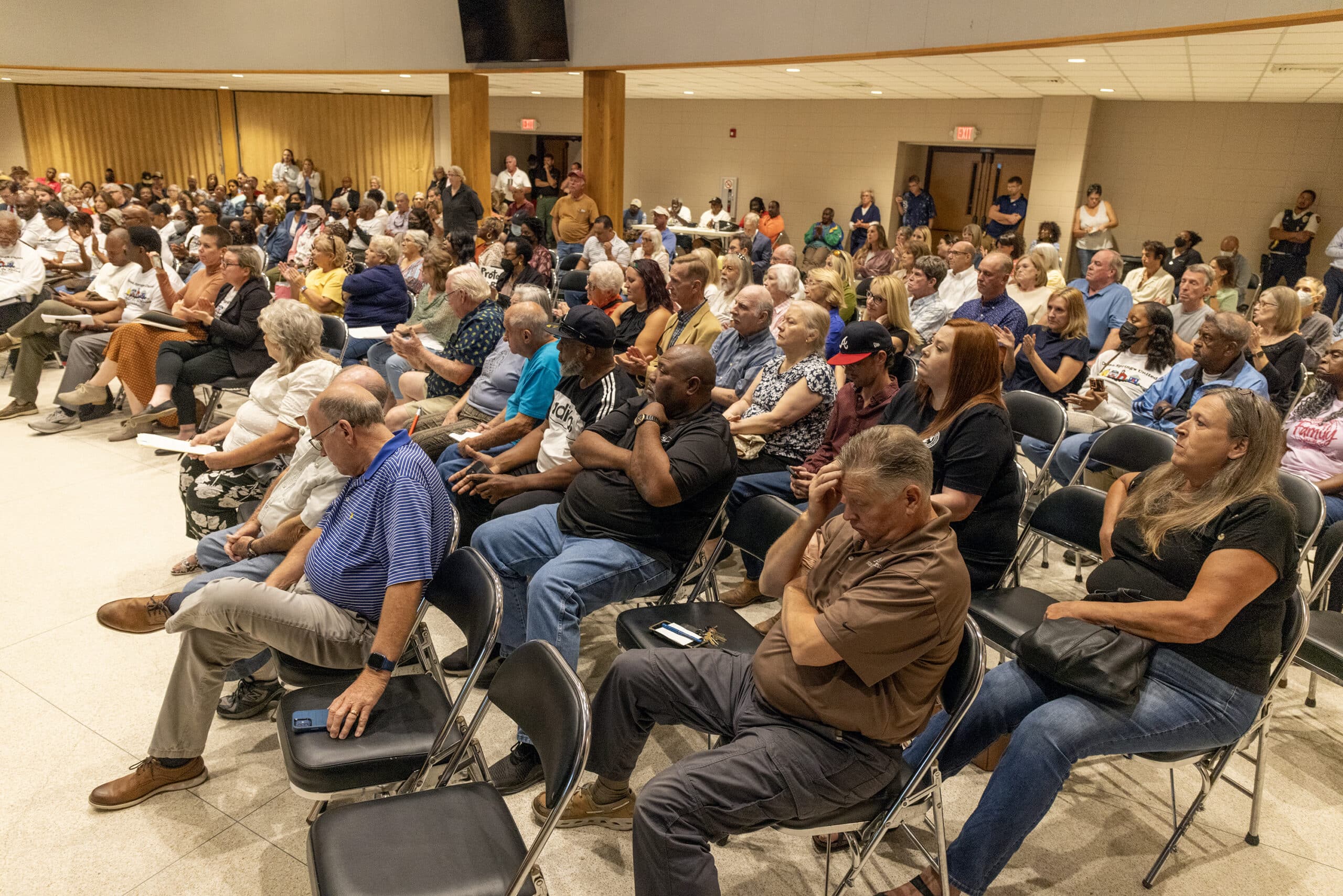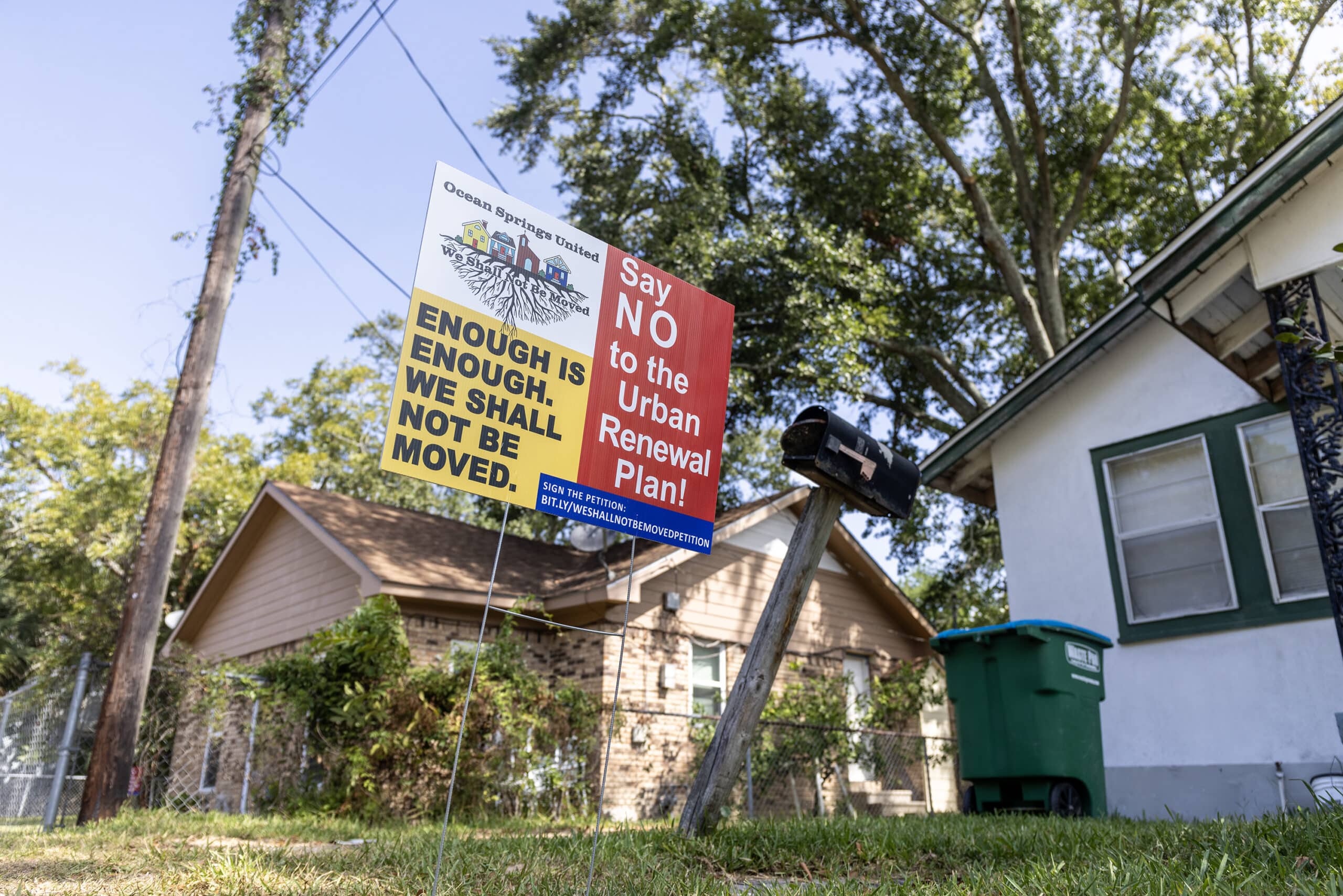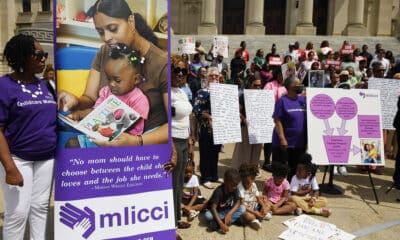Mississippi Today
‘Every man’s home is their castle’: How Ocean Springs’ pursuit for growth cost it the trust of its residents
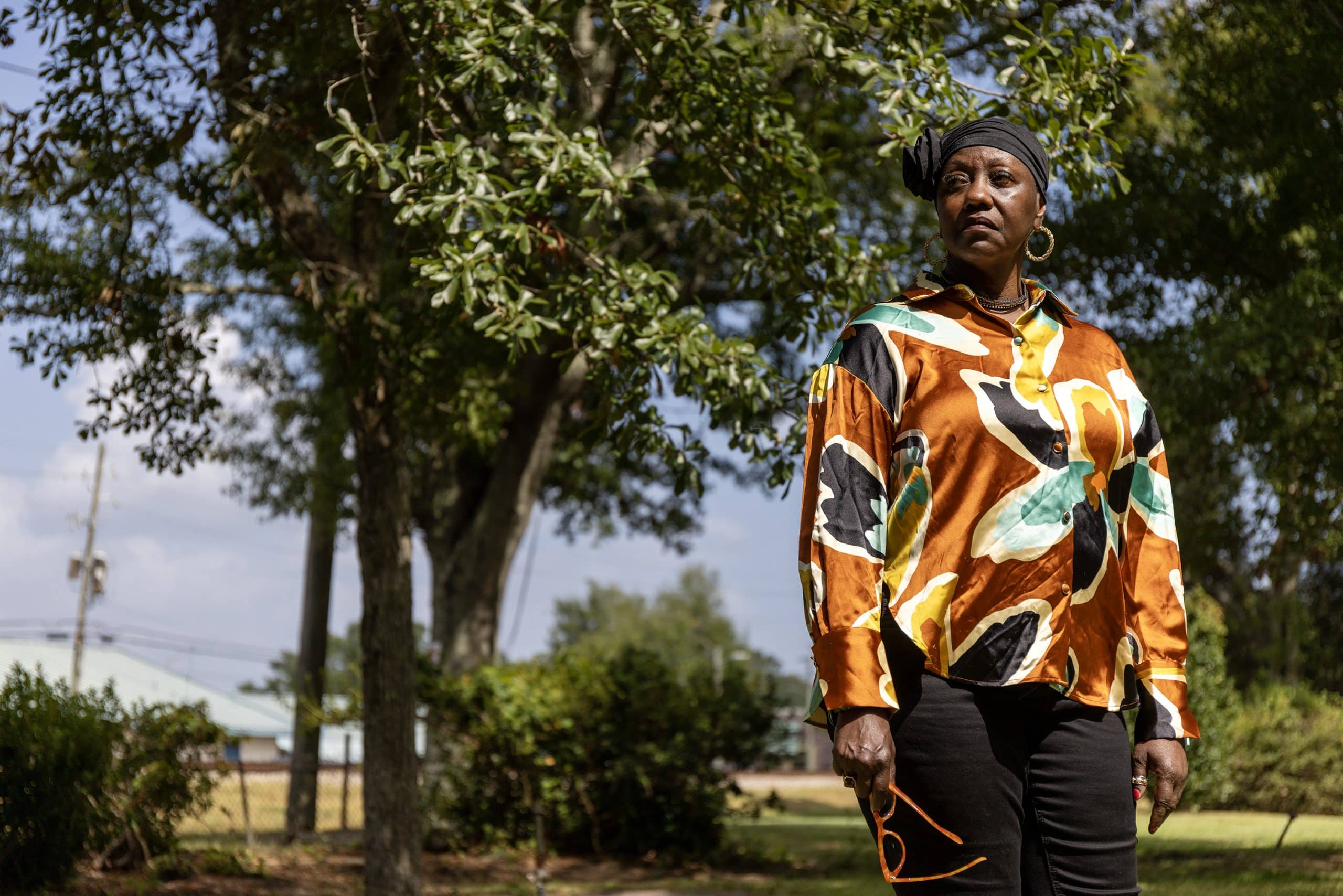

OCEAN SPRINGS – In many ways, Ocean Springs stands out from the rest of Mississippi.
Mississippi is 55% white and 36% Black; Ocean Springs is 79% white and 5% Black. Despite Mississippi’s underfunded and understaffed education system, Ocean Springs has received an “A” grade from the state for 10 years running. Despite being in the poorest state in the nation, Ocean Springs has a poverty rate lower than the country’s. Compared to the state overall, homes in the city are valued roughly one and half times higher.
National media has lauded the city in recent years: A 2022 USA Today list ranked it the best small coastal town in the country, praising its “quaint cottage-like” downtown and “artistic flair.” Another piece in the Wall Street Journal celebrated Ocean Springs for its “distinct charm.”
“We’re known for the historical homes, the mom and pop stores, the majestic oak trees,” described Greg Gipson, a native and longtime resident of the city.
But recent moves by city officials, Gipson and others feel, have started to erode that identity.
Mayor Kenny Holloway, who took office in 2021, says he wants to keep the charm that the so-called City of Discovery is known for. He believes to do that, the city has to think bigger.
“If the city’s not growing and moving forwards, you’re going backwards,” Holloway said in a recent interview with SuperTalk radio.
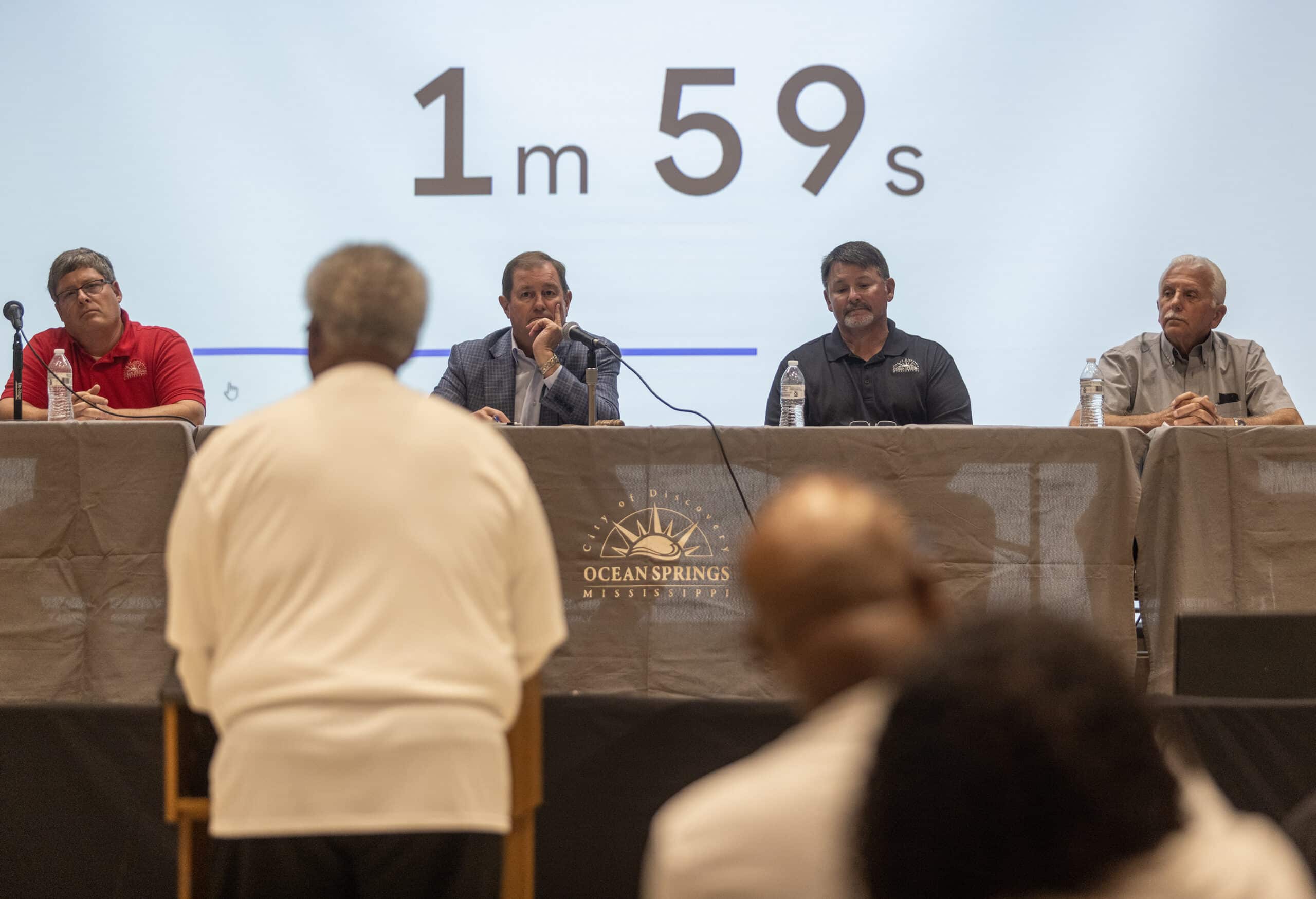
In the last couple of months, the mayor’s vision for growth has hit a wall: After word of a redevelopment plan spread through social media in August, the details of the plan drew a wave of dissent from residents, especially from those in a historic Black neighborhood called the Railroad District.
The Urban Renewal Plan lists over 100 properties in the city that officials, back in April, deemed to be “slum” or “blighted.” Those include vacant lots, small businesses, and old but still occupied homes.
The goal of the plan, as a city attorney told an audience at a recent public meeting, is to help the city qualify for federal development grants. Holloway, in an interview with Mississippi Today, explained that Ocean Springs wouldn’t normally qualify for certain grants, such as Community Development Block Grants, because the city’s median income is too high, which is why it had to single out specific areas as “blighted” to get funding for those properties.
When owners of those properties first saw the plan in August, their eyes clung to five words repeated throughout the document: “possible acquisition by the city.”

As it turns out, a Mississippi code allows cities to take someone’s property if the city designates it as “slum” or “blighted,” which is defined as places “detrimental to the public health, safety, morals or welfare.” In Mississippi, there’s no requirement for the city to inform property owners of the designation when it happens, and there’s also a 10-day limit on how long a property owner has to contest the designation, a restriction that doesn’t exist in most states.
In fact, most states don’t have any time limit, explained Dana Berliner, an attorney with the Institute for Justice. Berliner is representing Ocean Springs landowners in a recently filed federal lawsuit against the city over the redevelopment, which argues that the Mississippi laws violate the 14th Amendment right to due process.
The Ocean Springs Board of Alderman voted 5-2 to approve the designations at an April meeting, but the city neglected to notify any of the property owners beforehand. By the time property owners learned about the Urban Renewal Plan in August, the 10-day period had long passed.
After hearing from shocked and angered residents, Holloway said he was surprised by the pushback.
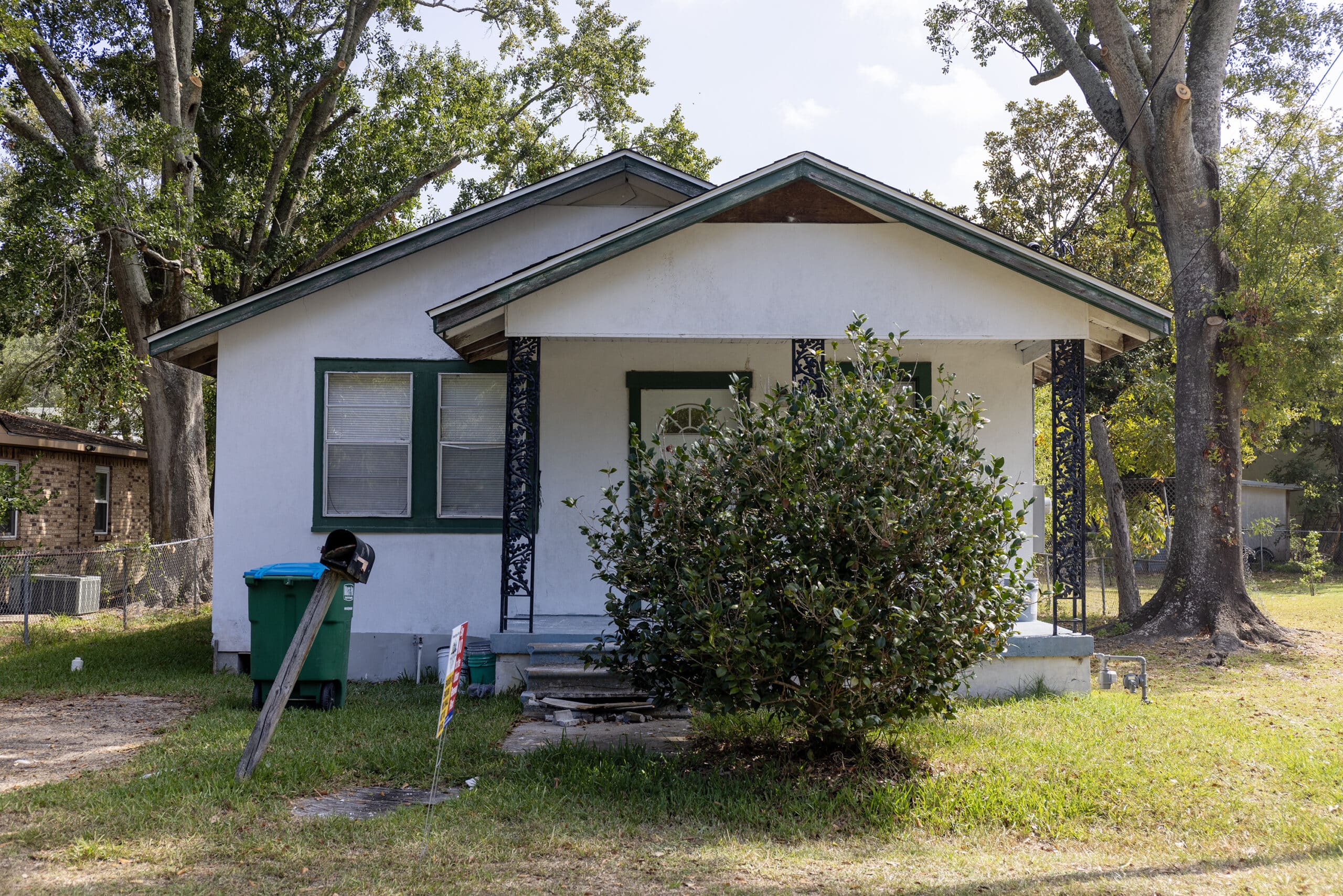
“We thought we were doing something that was very positive for every area and every citizen in Ocean Springs,” Holloway said. “If you had a house that needed sprucing up and (you wanted to use grant money), that’s what we were trying to present to that part of Ocean Springs.”
He admitted that the city could’ve done a better job communicating its intentions. As he repeatedly emphasized, the city has no interest in forcibly taking anyone’s property, and he added that he doesn’t believe anywhere in the city is actually a “slum.”
Still, he said, the city has followed the state law, explaining that “we’re not required to send out individual notices” when giving those designations.
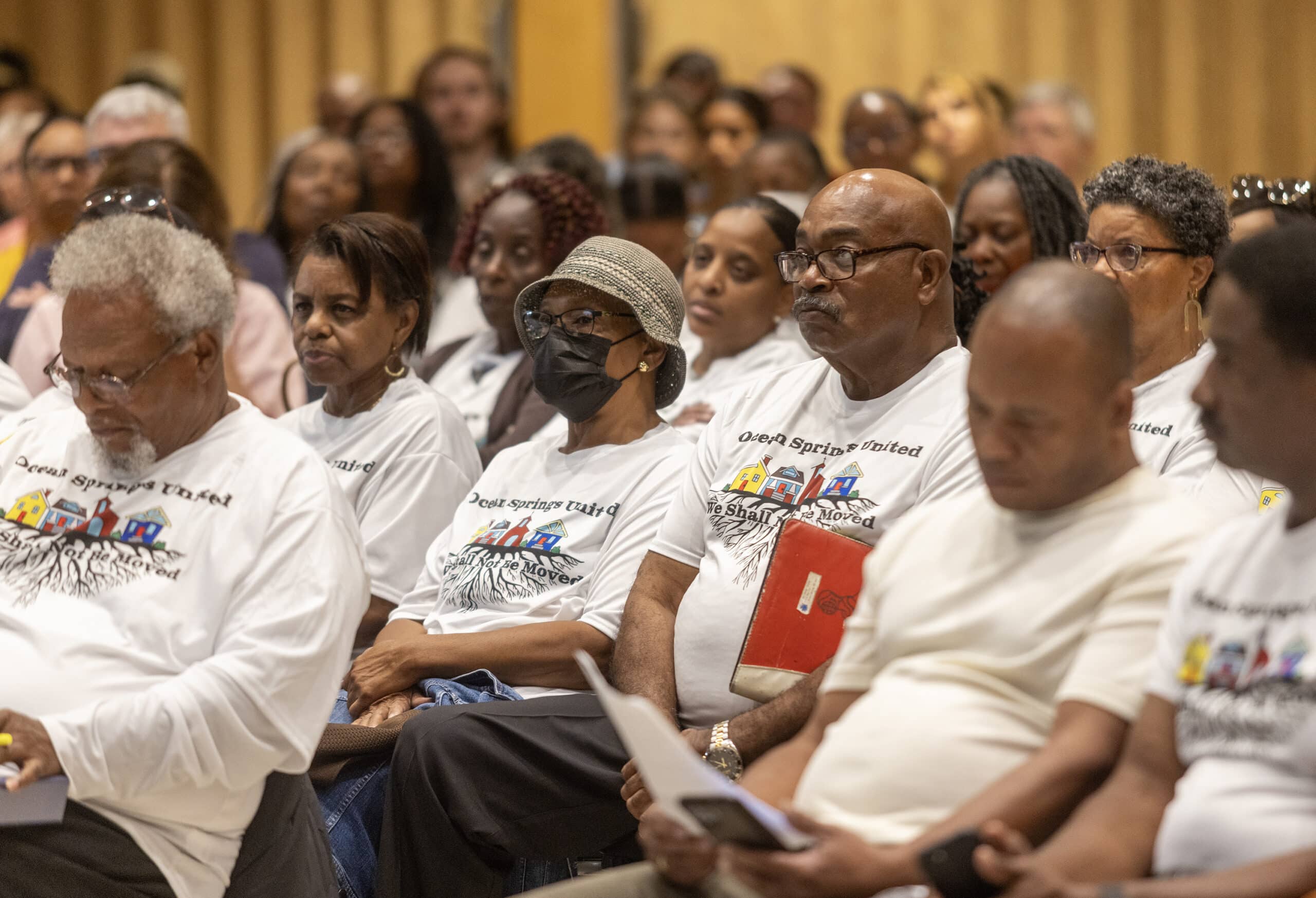
“It is not anything that we tried to hide,” Holloway said, explaining that maps of the plan were on display in city hall weeks before the April vote. “You got to understand, we get the commotion part of it. Did we roll it out properly? There were some errors we made, obviously. But we did everything by statute.”
Whether or not the Urban Renewal Plan includes acquiring properties, the homes of families who’ve lived in Ocean Springs for generations are stuck with the “slum” and “blighted” labels because they missed the 10-day appeal period. That means that, at any point, the city could still decide in the future to acquire those properties, with or without the owners’ approval.
In the weeks after residents discovered the proposal, more controversy from city hall widened the division between officials and the public.
At a September meeting of the city’s Historic Preservation Commission, a committee member was caught on microphone saying old homes in Ocean Springs, including those targeted in the redevelopment plan, “need to be burnt down.” The member later told the Sun Herald he was being “sarcastic.”
On a Monday night in early October, the city held a public meeting at the Ocean Springs Civic Center to hear feedback from residents on the Urban Renewal Plan. Of the dozens who spoke, only one person, a woman from nearby Pascagoula, supported the plan. Almost everyone else was critical of the mayor and aldermen sitting on stage before them.
“That was so disrespectful for someone to say something like that,” said John Joiner about the “burnt down” comments. Joiner spoke on behalf of resident Joe Daley, a cancer patient who was sitting next to Joiner and has lived in the city since 1946. “It’s their home. Every man’s home is their castle.”
Cynthia Fisher spoke about the property her grandmother bought in 1920 in the Railroad District, just outside of downtown Ocean Springs. The Urban Renewal Plan shows a picture of the home there, where Fisher’s sister now lives, with text reading, “The elimination of blighting conditions on this property will increase the probability of redevelopment of the neighborhood.”
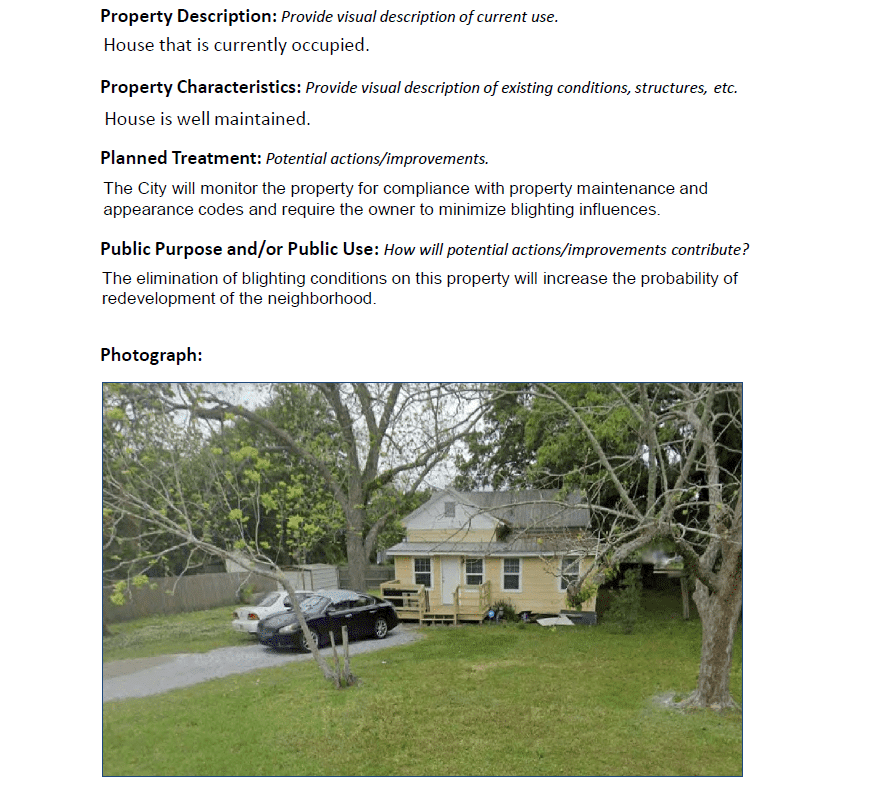
Fisher, who now lives around the corner from the house, told the officials that before bars started popping up nearby, “y’all didn’t even think about that part of town.”
“There’s a lot of history down there in that neighborhood,” she said. “For y’all to include that, that’s the only completely Black neighborhood in there.”
Rana Oliver, whose family’s home was also listed in the plan, said she only found out that her property was included when a friend messaged her on Facebook.
“Your Urban Renewal Plan was disrespectful, it was disrespectful because there was no notification to the citizens,” Oliver told the officials. “We’re your fellow citizens. And I want to ask you as my fellow citizens, where was your humanity?”
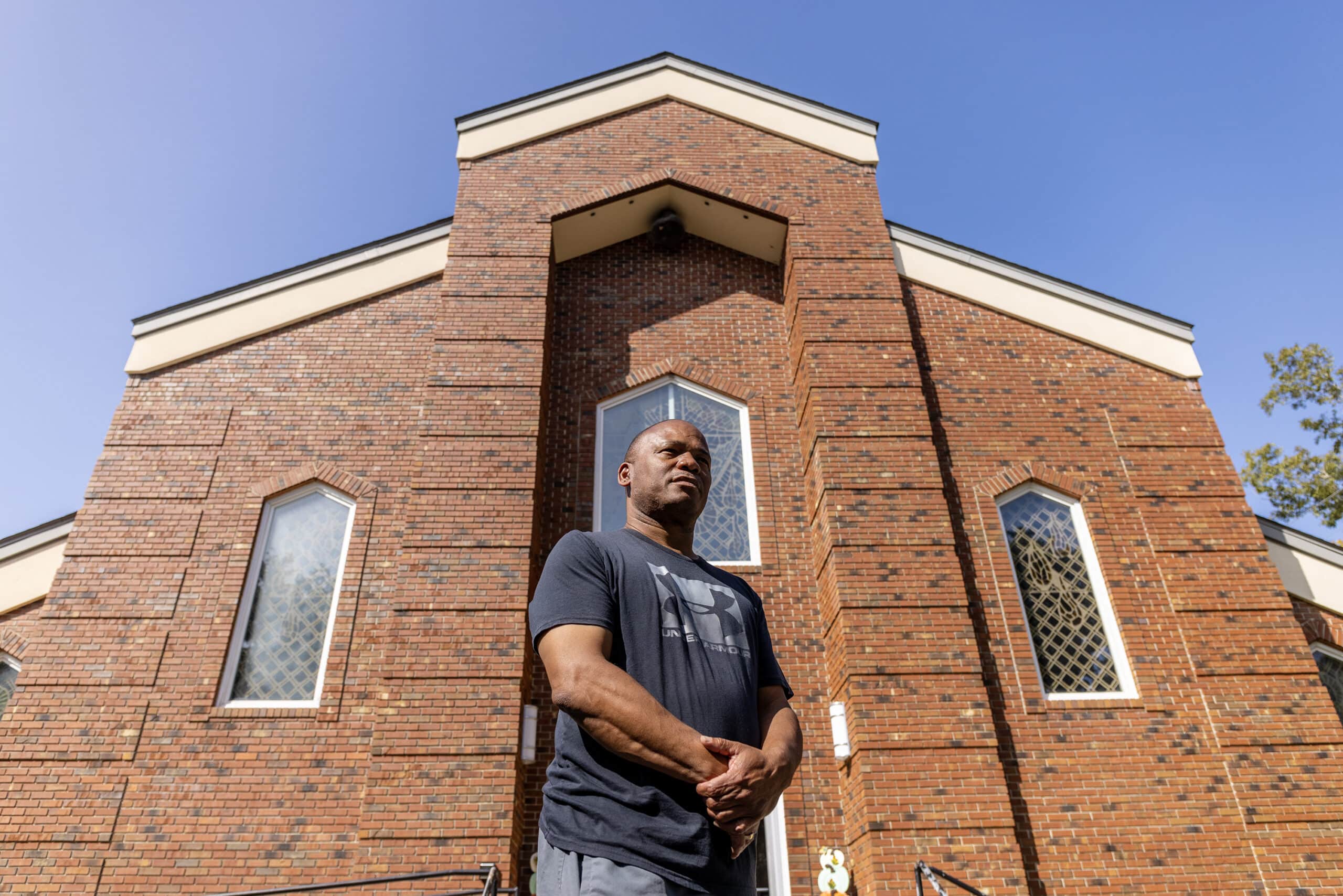
Even before the Urban Renewal Plan, residents in and around Ocean Springs were skeptical of the city’s pursuit for more development.
Four years ago, a group of residents sued the city over plans to build a beachfront condominium called “The Sands.” They argued that the area was primarily used for single-family homes, and that the Ocean Springs Board of Aldermen were bending zoning codes to allow the project to move forward. In 2021, a circuit court judge sided against the city, calling the board’s actions, “unreasonable, arbitrary, and capricious.”
Another avenue of growth the city has worked on for years is trying to annex surrounding parts of Jackson County, but last year the county Board of Supervisors voted unanimously against it.
Anecdotally, residents say the identity of the city, especially downtown, has shifted to accommodate more entertainment.
“When I first got here in the late 1990s, Government Street (in downtown Ocean Springs) wasn’t like it is now. It was more quiet, quaint,” said Sam Washington, board chairman of Macedonia Missionary Baptist Church. The church has been a hub in the Railroad District for decades, and part of its parking lot is included in the redevelopment plan.
“Over the years, it has gone more towards the ‘entertainment district.’ People going clubbing, people drinking,” Washington said.
Washington referenced a “to-go cup” law the city passed in 2016, allowing patrons to walk outside with alcohol in parts of downtown, just next to the Railroad District. Some longtime residents say the recent trend has come at the cost of the city’s character.
“I’m not saying I’m against development, but we have to do it in a smart way where we keep the charm of Ocean Springs,” said Gipson, the Ocean Springs local. “But when you start adding additional bars, additional hotels, and all this other stuff, it just does not match up with what this city was built on.”
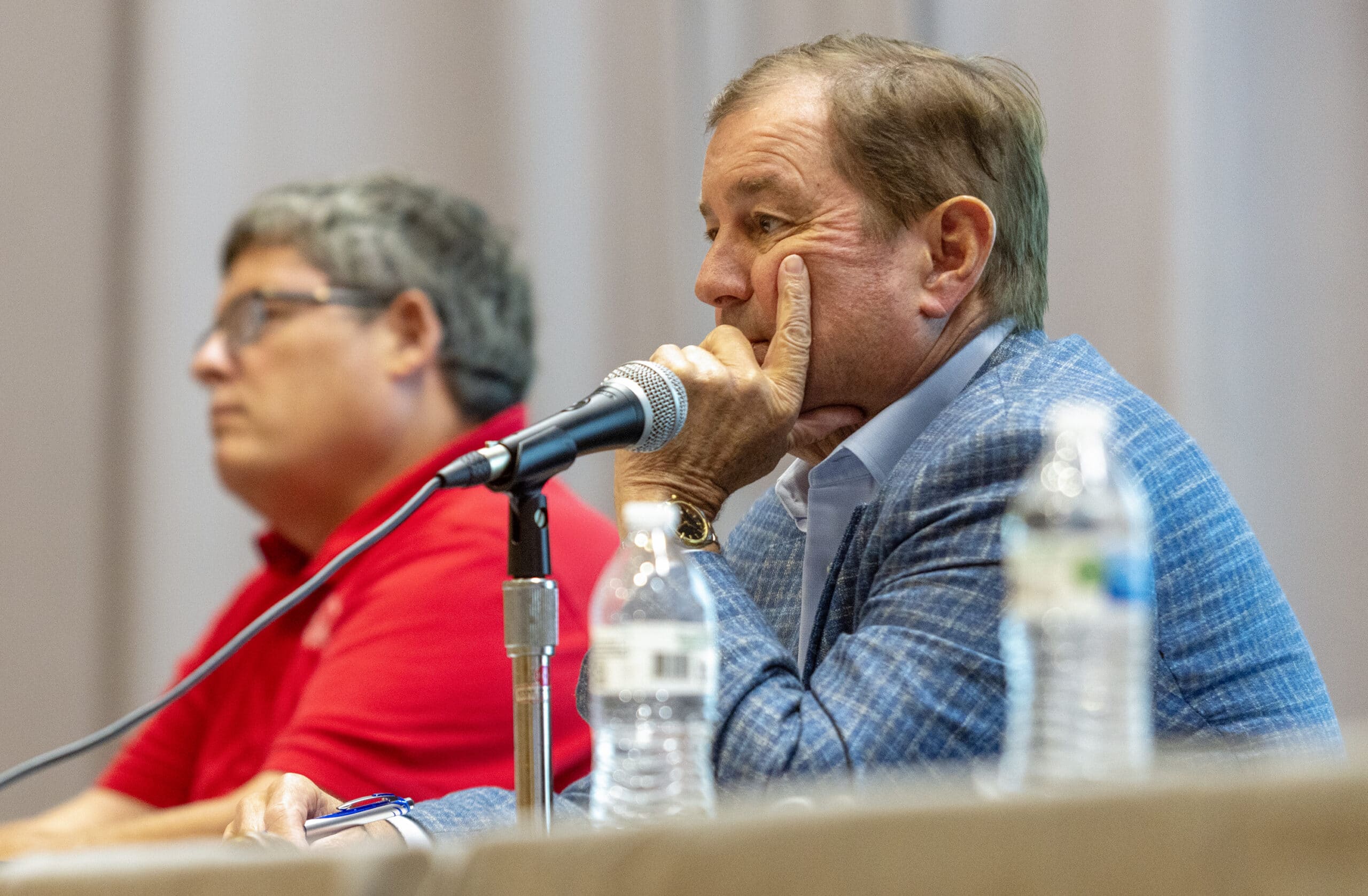
At the October public meeting, several residents raised concerns that the city was simply using the Urban Renewal Plan to transfer property over to private developers. Holloway, the mayor, is himself a developer; according to the bio on the city’s website, he’s a broker and owner of a real estate and development company.
According to a Mississippi Today analysis of campaign finance reports, Holloway received $32,550 – a third of his total itemized donations – from a plethora of businesses and employees in construction, civil engineering, urban planning, real estate and development. The mayor also received $2,000 from restaurants in downtown Ocean Springs, and another $2,000 from two companies proposing to fill wetlands along Ocean Springs in order to build multi-family housing.
In a city where only five percent of residents are Black, much less than in Jackson County and the state overall, a vast majority of homes listed in the Urban Renewal Plan are in the predominantly Black Railroad District.
The neighborhood, bisected by train tracks going East and West, was the main part of Ocean Springs that Black families felt welcome for decades, residents there say. Gipson, 56, said his father used his wages from working at the shipyard to build a home across the street from the Macedonia Missionary Baptist Church. He remembers as a kid recognizing that the Black families mainly stayed in that part of the city.
“This was an all Black area, we knew that,” he said. “We knew it, going to Sunday school, going to church. When we got to a certain point, up the road, down the road, they would have people looking out for us, and they would call and tell our parents, ‘They just passed by.’”

Curley Clark, president of the Jackson County NAACP Chapter since 1980, said the fact the Railroad District is being targeted in the redevelopment plan is a result of the city’s segregated history.
“Because of historical discrimination and historical redlining, Black people were only allowed to acquire property in certain areas,” Clark said. “The Black community remained where it was, and the white community expanded outwards. And since the central city remained in its present location, the Black neighborhoods end up being prime property.”
Holloway, as well as the aldermen, are all white. After hearing residents’ criticism, the mayor’s office spoke with both Clark as well as ACLU-MS.
Holloway told Mississippi Today about those conversations: “They don’t see anything wrong that we’ve done. They don’t see any racial issues attached to it.”
When Mississippi Today reached out to the groups, though, neither agreed with the mayor’s version of what was said.
Clark said that, while he agreed there weren’t any racist intentions in the plan, he told Holloway the city should’ve done more to include community members in the early stages of writing the plan.
“I take issue to that,” Clark said of the mayor’s account. “I looked him in the eyes and told him, ‘You didn’t develop the plan in the best manner, and you should’ve had more participation from the minority sector.’”
Ashley McLaughlin, director of Policy and Advocacy for ACLU-MS, said she never indicated she approved of the plan, and also told the mayor’s office the city could do more to build a relationship with community members.
With the recently filed lawsuit, the plan’s future is unclear. The city is giving property owners an option to sign an “opt out” form until the end of October to leave them out of the plan, but which would also prevent them from receiving the grants the city is looking for.
While the mayor said the city has “pumped the brakes” after hearing residents’ feedback, he also said he and the city aldermen will revisit the redevelopment proposal in the future.
“Our city attorney spoke with Attorney General (Lynn) Fitch who will address the claims that the urban renewal plan statutes are unconstitutional,” Holloway said in response to the lawsuit, reiterating that the city still has yet to vote to approve the plan. “The city’s proposed Urban Renewal Plan has not violated anyone’s rights. It is unfortunate that our residents have chosen to file a lawsuit instead of having a constructive discussion with the city.”
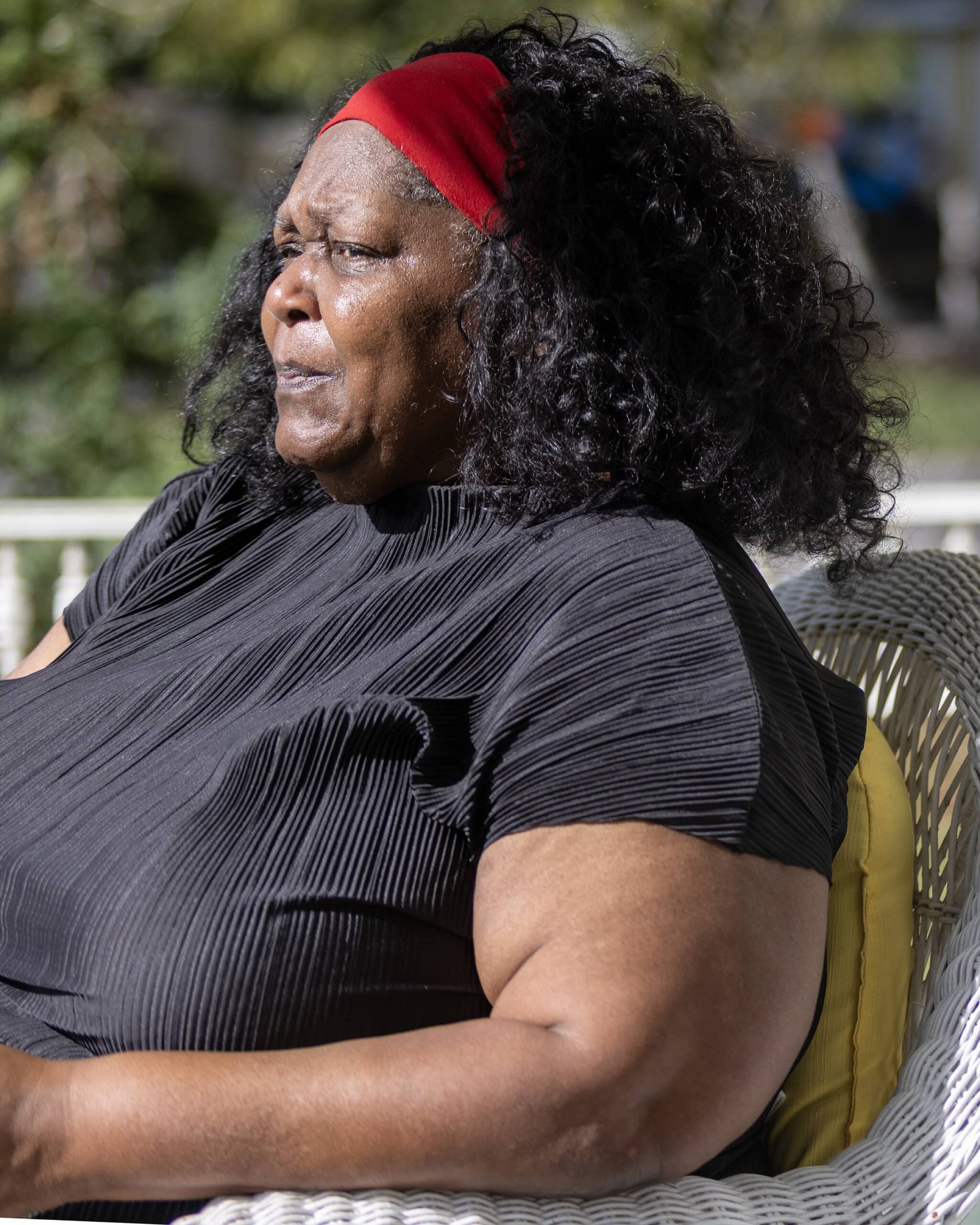
None of the city’s aldermen responded to requests for comment from Mississippi Today.
Attorney Elizabeth Feder-Hosey, an Ocean Springs resident and native, is representing the residents and business owners and church in the lawsuit. She’s working on the complaint with the Institute of Justice, a Virginia-based nonprofit that specializes in eminent domain cases.
At the October public meeting, Feder-Hosey criticized the officials for their lack of transparency.
For example, she noted later in an interview, the agenda for the decisive April board meeting only stated the “Urban Renewal Plan,” and nothing about designating areas as “slums” or “blighted.
“And then you’ve got the complete lack of notice,” Feder-Hosey added. “There’s that whole, ‘We didn’t have to (tell people), so we didn’t do it.’ Which to me is not about serving your people. If you want the community to buy into your plan, you give them a seat at the table and you tell them what the plan is, all the steps of it, the benefits, the risks. The city’s kind of just piecemealed out these little morsels for people to hang on.
“At no step has the city done anything to earn the trust of its people.”
This article first appeared on Mississippi Today and is republished here under a Creative Commons license.
Mississippi Today
Gov. vetoes bill providing hospitals ‘stability’

Gov. Tate Reeves vetoed a bill Thursday that would help stabilize hospitals, calling it the “Grady Twin” of a bill he vetoed in March.
Lawmakers made some changes to the previously vetoed legislation in a new bill, but kept much the same. Reeves cited many of his same concerns this time around, including alleged contradictions and the loom of a deficit.
The bill, authored by Senate Medicaid Chairman Kevin Blackwell, R-Southaven, sought to make several changes to the Medicaid program – from mandating providers screen mothers for postpartum depression to requiring the agency to cover a new sleep apnea device.
Blackwell did not respond to a request for comment by the time of publication.
Arguably the largest impact of Senate Bill 2386 would have been that it called for locking in place supplemental payment programs that have been a lifeline for hospitals – but which are unreliable as they vary from year to year, according to Richard Roberson, CEO of the Mississippi Hospital Association.
That fluctuation makes it difficult for hospitals to plan what services they can offer.
“The supplemental payment language was intended to offer better budget predictability as hospitals move through these uncertain times and instructed the Division (of Medicaid) to maximize federal funding,” Roberson said. “… Hospitals, like other businesses, need stability to continue to serve their communities effectively.”
Supplemental payment programs bring in around $1.5 billion federal dollars to Mississippi hospitals each year.
Reeves said in his veto statements for both bills that locking the payment program in place is in contradiction with another of the bill’s mandates, which would change the program to allow out-of-state hospitals that border Mississippi to participate in the program.
“It is logically nonsensical for Senate Bill 2386 to, on the one hand, freeze the MHAP, while on the other hand, mandate that the Division open the program to include an additional hospital.”
But Roberson said the language of the bill would not prohibit the programs from growing – it would merely clarify what hospitals need to do to get paid.
Reeves again said the bill “seeks to expand Medicaid.” The bill brings forth code sections related to eligibility requirements, but it doesn’t call for expanding the Medicaid population by increasing the income threshold, which is what is typically referred to as Medicaid expansion under the Affordable Care Act.
Thursday’s vetoed bill was hospitals’ last recourse for stabilizing their budgets via legislation.
Richardson says the Mississippi Hospital Association has now turned its sights toward the Division of Medicaid to secure hospitals’ payment programs without the help of the Legislature.
“With or without Senate Bill 2386, we are hopeful the Division will work to stabilize the model,” Roberson said.
This article first appeared on Mississippi Today and is republished here under a Creative Commons Attribution-NoDerivatives 4.0 International License.
Mississippi Today
Parents, providers urge use of unspent TANF for child care
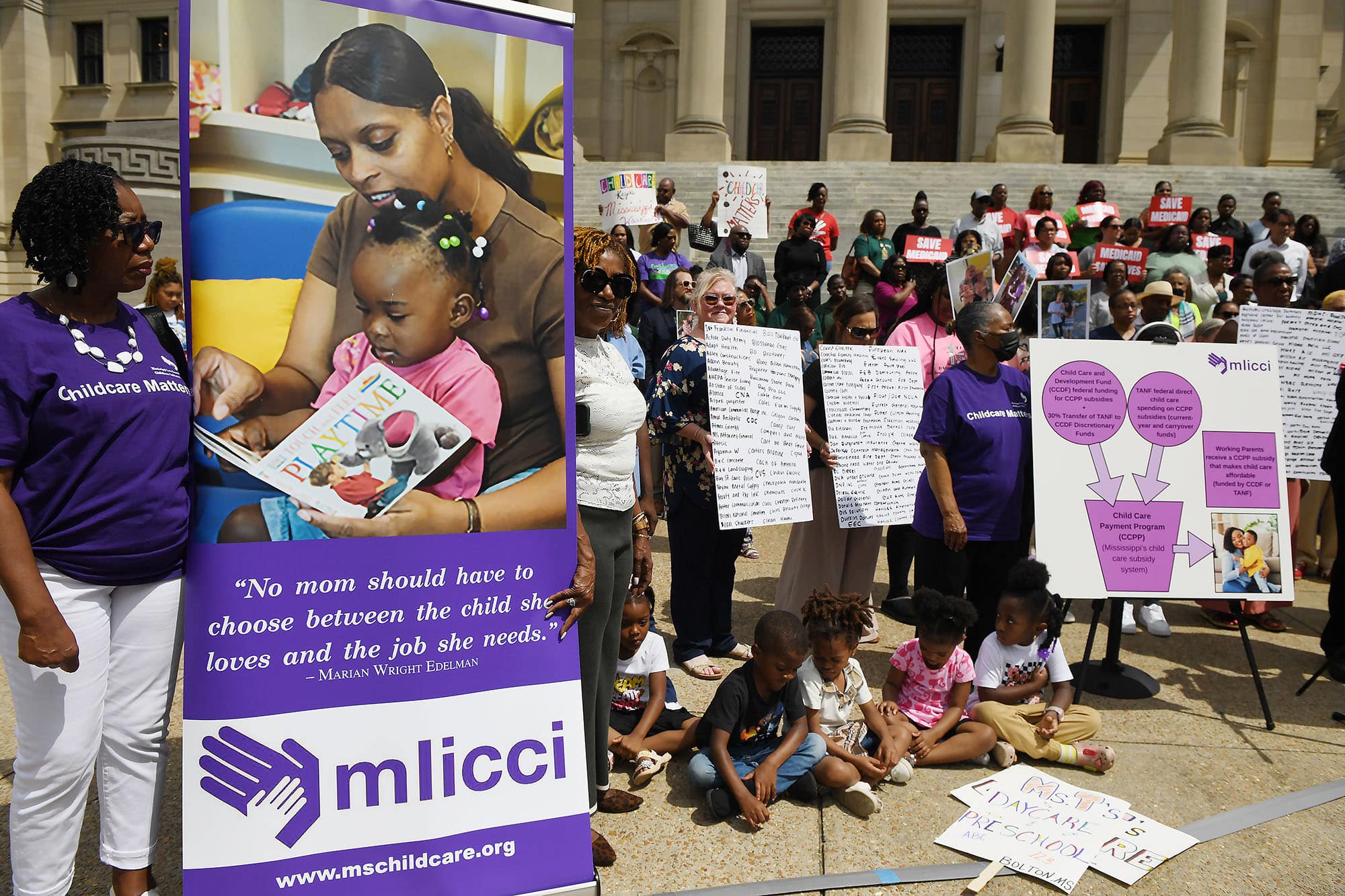
Child care providers, parents, children, legislators and advocates gathered outside the state Capitol Thursday to call on Mississippi to use unspent welfare funds and resume accepting child care certificate applications.
Last month, the Mississippi Department of Human Services announced it will temporarily stop accepting new applications, redetermination applications and “add a child” applications for the child care certificate program for certain families as the result of the loss of COVID-19 relief funds. The hold, started March 31, will continue indefinitely. The program provides child care vouchers to eligible families, often with a co-payment fee.
MDHS explained that without the COVID-19 relief funding the number of families with child care certificates is more than it can support long term. When asked how long the hold would last, chief communications director Mark Jones explained the hold would end when the number of children with certificates dropped below 27,000 children and $12 million in monthly costs.
The week before the hold began, on March 28, 36,186 children had child care certificates. 25,300 of them fit into one of the MDHS’s priority categories. 10,800 did not.
The Mississippi Low-Income Child Care Initiative, Child Care Directors Network Alliance, Mississippi Delta Licensed Child Care Providers, and Mississippi Black Women’s Roundtable organized Thursday’s gathering and press conference to implore MDHS to tap into unused TANF funds to book the child care payment program.
“DHS has about $156 million in money from prior grant years that has gone unspent,” said Carol Burnett, MLICCI’s executive director, at the press conference.
The child care payment program gets funding from federal and state sources. It received $127 million from the Child Care Development Fund in fiscal year 2024, as well as $7 million in state appropriations, and $25.9 million transferred from the Temporary Assistance for Needy Families grant.
That $25.9 million is 30% of the state’s annual TANF grant money transferred into funds for child care certificates. It is the maximum amount they’re allowed to transfer under federal law. The state also spends 85% of its money from the child care development fund on certificates, when federal law requires them to use at least 70%.
MLICCI and others want MDHS to add to that by spending current and carryover TANF funds on child care subsidies for families that qualify for child care certificates. According to a memo MLICCI prepared, this method does not require legislative action, has no spending limit, and is already used by other states.
Under the current hold, families can apply and get their certificates renewed if they fall in one of the following six categories: on Temporary Assistance for Needy FamiliesTANF or transitioning off of TANF, homeless, with foster children, teen parents, deployed military, orand with special needs. The Division of Early Childhood Care & Development will continue paying for certificates for all families until their certificates expire.
In a statement, MDHS’ chief communications officer Mark Jones said “MDHS understands these concerns and reaffirms its commitment to support child care, transportation, education, and other needs of families who need to return or remain in the workforce. Our aim is to ensure our approaches are sustainable.”
Burnett, parent KyAsia Johnson, state Rep. Zakiya Summers, D-Jackson, and multiple child care providers talked about the toll the hold has taken on child care centers and families. They also stated the importance of child care to sustain the state’s workforce, keep child care providers afloat, and educate young children.
They also urged citizens to contact the state’s political leadership to get their attention.
“This decision is putting people like me in an impossible situation,” said Johnson, a child care provider and parent. “What am I supposed to do without child care?”
Each provider spoke about how they had to explain the hold to parents, many of whom have had to pull their children out of day care. Cantrell Keyes, director of Agape Christian Academy World in Jackson, had five families pull their children out of her center. “More than half of my school tuition comes from CCPP,” she said.

Rep. Summers called on MDHS to lift the hold on child care applications, use the extra TANF funds, and communicate better with parents and providers.
“Right now, thousands of Mississippi children might lose child care, not because the need has disappeared, but because the agency has made a choice,” she said.
The hold on child care certificates comes at a time when many child care providers and parents are struggling to stay afloat amid high costs, high turnover and high demand.
Deloris Suel, who owns Prep Company Tutorial Schools in Jackson, said, “Child care is in crisis. We’re not heading for crisis, we’re in crisis.”
This article first appeared on Mississippi Today and is republished here under a Creative Commons Attribution-NoDerivatives 4.0 International License.![]()
Mississippi Today
Tyler Perry comedy about a Mississippi lieutenant governor ‘She The People’ set to stream on Netflix

Netflix has announced it will stream “She The People,” a comedy written, produced and directed by Tyler Perry based on a fictional newly elected Mississippi Lieutenant Governor, Antoinette Dunkerson, played by Terri J. Vaughn.
According to a trailer released Thursday and press about the show, the new Lt. Gov. Dunkerson character realizes her new job will be extremely tough due to a sexist and condescending governor.
Executive producers for the show include Niya Palmer, Vaughn and former Atlanta Mayor Keisha Lance Bottoms. The cast also includes Tre Boyd, Dyon Brooks, Jade Nova, Jo Marie Payton and Drew Olivia Tillman.
The first eight-episode season debuts May 22 on Netflix, with a second eight-episode season premiering Aug. 14.
This article first appeared on Mississippi Today and is republished here under a Creative Commons Attribution-NoDerivatives 4.0 International License.
-

 News from the South - Florida News Feed5 days ago
News from the South - Florida News Feed5 days agoJim talks with Rep. Robert Andrade about his investigation into the Hope Florida Foundation
-

 News from the South - Alabama News Feed7 days ago
News from the South - Alabama News Feed7 days agoOp-Ed: Colleges shouldn’t need remedial algebra classes: Five K-8 policy solutions to address math proficiency | Maryland
-

 News from the South - Virginia News Feed7 days ago
News from the South - Virginia News Feed7 days agoHighs in the upper 80s Saturday, backdoor cold front will cool us down a bit on Easter Sunday
-

 News from the South - Arkansas News Feed7 days ago
News from the South - Arkansas News Feed7 days agoValerie Storm Tracker
-

 News from the South - Kentucky News Feed6 days ago
News from the South - Kentucky News Feed6 days agoU.S. Supreme Court pauses deportations under wartime law
-

 Mississippi Today5 days ago
Mississippi Today5 days ago‘Trainwreck on the horizon’: The costly pains of Mississippi’s small water and sewer systems
-

 News from the South - Alabama News Feed4 days ago
News from the South - Alabama News Feed4 days agoPrayer Vigil Held for Ronald Dumas Jr., Family Continues to Pray for His Return | April 21, 2025 | N
-

 News from the South - Texas News Feed4 days ago
News from the South - Texas News Feed4 days agoMeteorologist Chita Craft is tracking a Severe Thunderstorm Warning that's in effect now
